Yachting Monthly
- Digital edition

How to pass your Yachtmaster exam
- Chris Beeson
- September 16, 2015
The global standard of sailing qualifications is achievable for any experienced, competent skipper. Tom Cunliffe explains how to pass your Yachtmaster exam
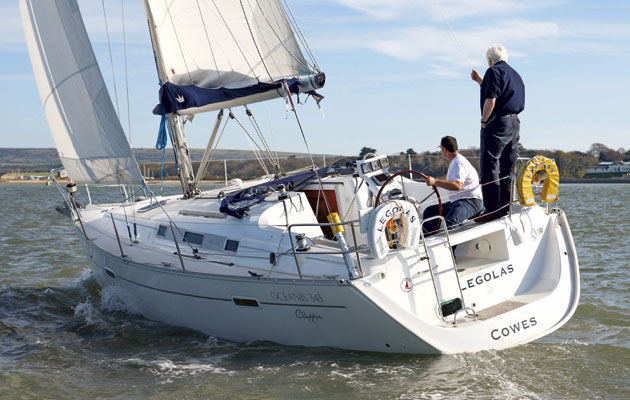
The only certificates accepted by the authorities are those issued after an at-sea examination. To become a fully-fledged Yachtmaster, the practical test is the only one that counts Credit: Graham Snook/YM

Tom Cunliffe is an RYA Yachtmaster examiner. He has passed and failed hundreds of Yachtmaster candidates over the years
We in the UK are exceedingly fortunate. Just as the English language is the best bet for a world traveller, our very own RYA/MCA Yachtmaster qualification happens to be the global standard for sailing. It’s required for anyone planning to become a professional and, thanks to the continuing efforts of the RYA, Brits who sail for leisure still don’t have to carry any proof of competence in home waters. Despite this blessed lack of regulation, the Yachtmaster certificate remains the logical target of many a self-motivated sailor. It also represents the icing on the cake for those looking for the reassurance of an external assessment.
Courses and exams
Yachtmaster training can take place on a boat or in a classroom. A shore-based course, either at desks in a school or via the increasingly popular Internet distance learning programmes, ends with a Yachtmaster theory exam. Success in this will help a student in subsequent qualification upgrades, but it is not officially recognised. The only certificates accepted by the authorities are those issued after an at-sea examination – the Yachtmaster Practical . To become a fully-fledged Yachtmaster, this practical test is the one that really counts.
Yachtmaster Prep

Meteorology matters: a favourite with examiners is to produce a weather map and invite you to analyse it. Be ready and know your subject
This is a non-RYA course and, as such, has no official status or syllabus. However, it is run successfully by many RYA sailing schools to prepare candidates for an examination which generally follows on at the end. Up to four students spend several days together on the boat in which they will be examined. The benefits are that they get to know one another and their yacht under the guidance of a highly qualified Yachtmaster Instructor. The general feeling is that these tutors can’t teach you much you don’t already know in a week, but that they are very good at coaching the best out of those skills you already have. Prep courses are great for brushing up on how to jump through the various hoops an examiner may set up. What they can’t do is make someone who doesn’t have suitably constructive mileage into the confident skipper examiners are looking for.
Coastal or Offshore – what’s my level?
Recently, the old Coastal Skipper ticket has been superseded by the new ‘Yachtmaster Coastal’ certificate. The qualifying mileage for this MCA-recognised qualification is 800, with passage and night-hour requirements being relaxed in comparison with ‘Yachtmaster Offshore’, which keeps its 2,500-mile entry level. Either is a proper Yachtmaster qualification and can be described as such. Only the often-dropped suffix distinguishes the two. The syllabi are identical, the variant is the rigour of the examination. Apply for ‘coastal’ and the examiner, recognising that you have less sea-time, will be more inclined to cut you a bit of slack.
The RYA has noted that most candidates are really only making ‘coastal-status’ passages. In real terms, this includes an annual trip across the Irish Sea, the North Sea or the Channel in a calculated weather window, which is very different from setting off from Ramsgate towards Norway with five days and potentially serious conditions ahead of you. The implications should be clear: unless you need the Offshore ticket for professional reasons, if in doubt, go for Coastal.
Preparing yourself and the boat
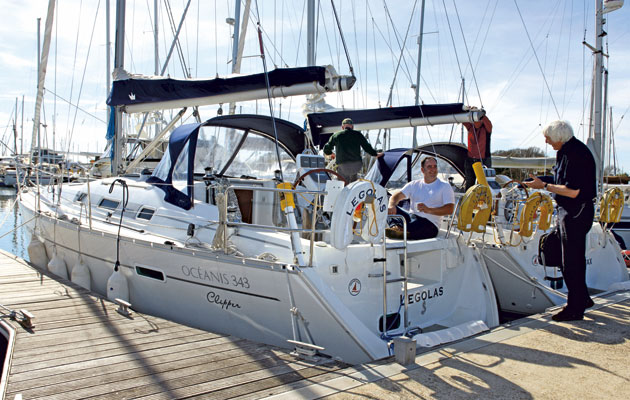
A relaxed candidate with a mug of tea makes a better impression than a harassed-looking one
If you’ve signed on with a sailing school, you’ll be stuck with the boat you’re given. You can be confident that this yacht ticks all the official boxes by being coded for commercial use, but while some are very up-together, others are not. If the boat is generally sloppy and scruffy, you can at least make an effort to stow the mainsheet in a seamanlike manner while you are nominally skipper.

Neatly coiled lines reflect well on the skipper
You can also ensure that fenders are hung at the same level, sharpen up the guardrails and see that things generally look as though somebody knows the difference and cares. Then the examiner won’t hold the ratty lifebuoys and the smelly bilge against you.

Mind that your dress and demeanour don’t make a bad first impression
Try to be ready in good time so that you aren’t involved in a last-minute kerfuffle. If you’re relaxing in the cockpit with a mug of tea when the examiner arrives, he or she will be more impressed than if you’re frantically working out tidal heights and scuffling through the chart table. Wear sensible kit. Don’t worry if it’s not this season’s fashion. My examiner turned up in an old duffel coat back in 1978 and I think I was wearing a canvas smock and a flat cap, but the smock was freshly laundered and the cap was right way round…
The main thing is that you can sail, but an examiner is always pleased to be freed of any hassle with the paperwork. Most of us are no better with admin than you are, so make our lives easy by producing an up-to-date first aid ticket and all the rest, plus a cheque made out to the RYA – not the examiner, perish the thought!
Passage planning

Your passage plan should be realistic. Keep it simple and be ready to adapt and update as things develop
You may be given the opportunity to produce a passage plan before the examiner arrives. If so, make it realistic. Don’t plot every course to the last degree. After all, you don’t know what speed you’ll make or what the wind will really do. Check tidal gates, distances, viable alternatives and the weather. Look at any hazards, sort out a time to leave and have a plan for updating as things develop. That’s about what you’d do if there were no exam, and that’s what I, at least, want to see.
Examination on your own boat
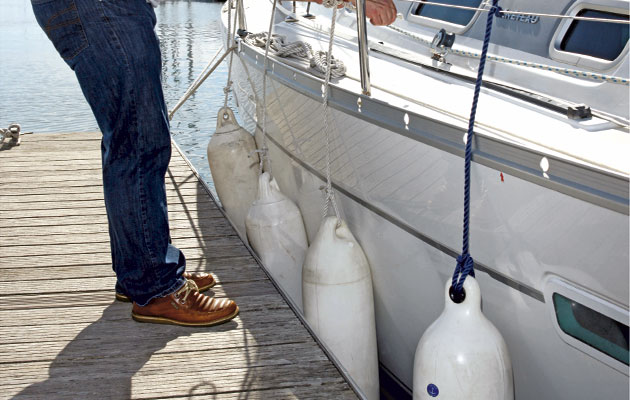
A nicely level line of fenders sends a good signal to the examiner
You don’t have to go to a sailing school to be a Yachtmaster. I love it when a candidate asks to be examined without training on his own boat. Don’t worry if she isn’t coded. There’s no legal requirement that she should be. Most of mine haven’t been either, and I couldn’t care less.
As an examiner, I want to see that your priorities are sound and that you’re thinking clearly and for yourself. On the day, the yacht must be clean, tidy and seamanlike. Waterline crisp, sail covers Bristol fashion, not looking like some poor bird with a broken wing, ropes carefully stowed, a comprehensive chart kit for the waters to be sailed, the makings of a meal plus snacks and, of course, everything that counts should be working.
What the examiner is looking for
Feeling relaxed in close quarters

Competent, confident boathandling counts well in your favour
If there’s one thing that will upset an examiner, it isn’t that you forgot to put on your lifejacket, it’s that he feels insecure when you begin manoeuvring in a marina. Take it from me, there’s nothing worse than sitting at the backstay wondering what you’re going to hit. If the boat slides sweetly out of her berth with everyone knowing what’s required and no shouting, then moves away easily with the examiner confident you’re in charge, that you’ve checked the next alleyway for collision risk, that your choice of speed is sensible and efficient and that it never enters his head to feel anxious, you’re well on the way to a pass after five minutes. No course can teach you this. It can only tick the box confirming you’ve managed it once or twice. The rest is up to you and your sea time.
Wind awareness
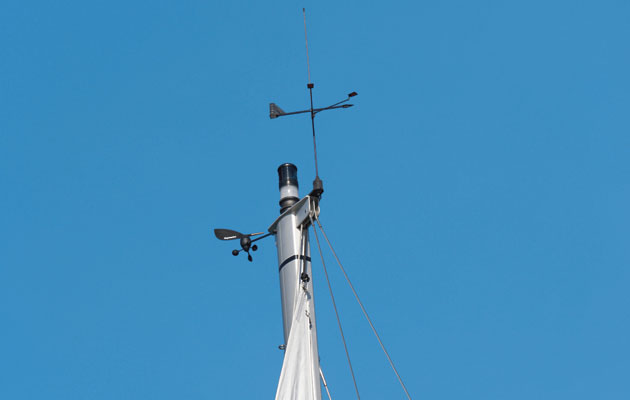
You should always be aware of the true wind direction and how it will influence any manoeuvres
Here’s another subject you can’t learn on a prep course. Knowing where the wind is and how it relates your position to any impending manoeuvres is critical. I often ask a candidate where the wind is coming from when he’s approaching a situation we both know will involve some sort of gyration under sail. If he looks instinctively at the masthead or, worse still, an instrument set to apparent wind, he’s dropped a bagful of points. At this stage, his mind should be setting up where the boat will best be placed to make her critical turns. Apparent wind isn’t going to help him much. What he should be doing is glancing at the water and noting the tiny ripples to assess what the true wind is actually doing. I’m often amazed at how many folk have never been shown how to do this. Racing sailors can handle it in their sleep, because they need to predict windshifts, but cruisers tend to get lazy, so make sure you can read the wind.
Good sailing
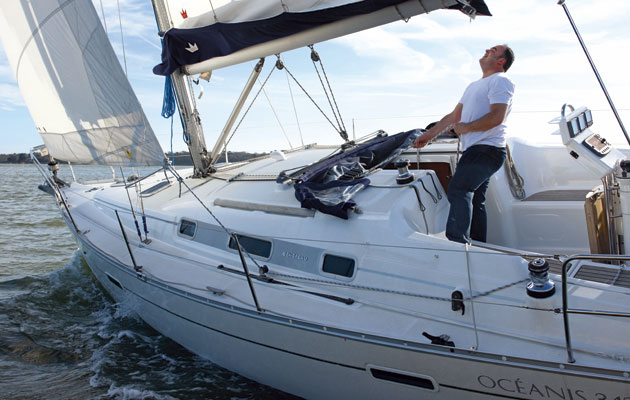
No need for incessant, race-style tweaking, but pay due attention to sail trim while the yacht is under way. If there’s a mainsheet traveller, use it
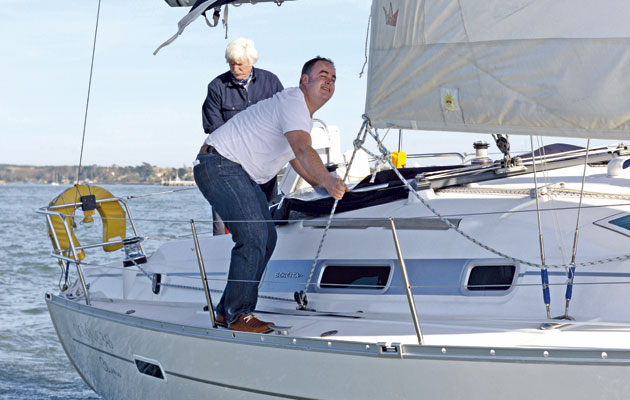
Ensure that the genoa sheet leads are properly positioned for the point of sail you’re on

Lovely: both mainsail and genoa set up with the right amounts of tension and twist
All examiners hate to see a yacht sloppily sailed on passage. Make sure that your crew are using the traveller, that genoa fairleads are properly positioned, that the main is well set up with kicker and mainsheet tension for twist. Above all, do not sail over-sheeted. It’s a dead giveaway that you just haven’t been out there enough yet.
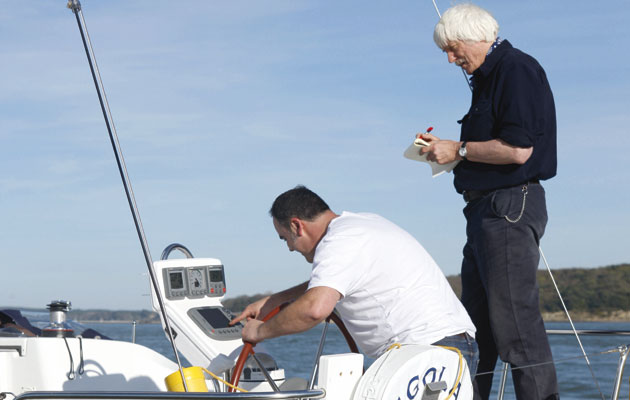
Too much staring at the plotter screen betrays nervousness
In the days before GPS set navigators free, people used to fail exams by what we called ‘sailing the chart table’ rather than skippering the yacht. Assuming the test to be all about some sort of imagined ‘correct navigational practice’, candidates nailed themselves to the navigatorium when they should have been up on deck directing operations and watching out for the ship coming up astern that was suddenly looking bigger every moment. Well, guess what? Nothing has changed. This remains a big problem with neophyte Yachtmasters.
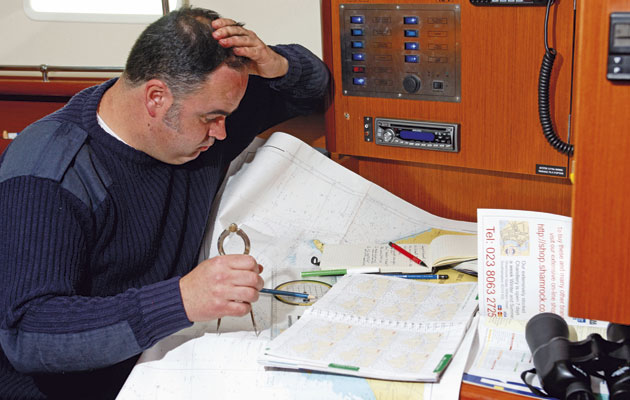
Sail the boat, not the chart table
The secret is to plan well, then nip below every so often on passage to keep an eye on what’s going on in the chart department and whizz back on deck pronto to carry on skippering the boat. I’ll lay a pound to a penny it’s what you do when there’s no examiner on board, so have the confidence to back your own usual practices. This is particularly important at night in crowded waters. An unsuccessful candidate often fails himself by allowing disorientation to creep in, simply by not keeping the true perspective on events, which can only be found on deck.
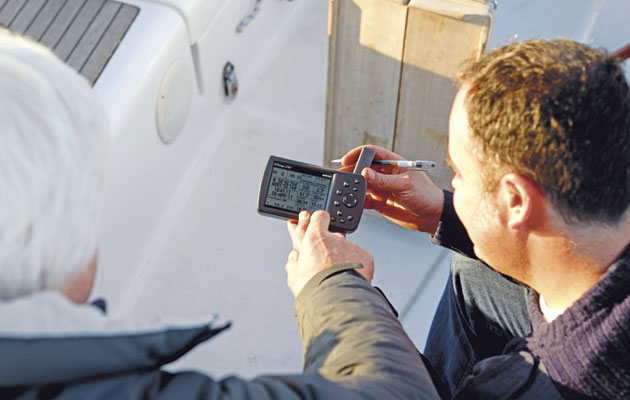
The use of electronic nav-aids such as GPS is not ‘cheating’ – it’s an integral part of navigation
All examiners have their own take on use of electronics. Personally, I want to know my candidate is making modern aids to navigation, including a chart plotter if there one, an integral part of his navigational policy. The idea, as one candidate suggested, that use of GPS is somehow ‘cheating’ is incomprehensible to me. I will almost certainly ask at some stage that the yacht be navigated classically, to see how easy my man is with what, for most people, are now backup skills. If I’m unconvinced by his performance, off he goes to think again.
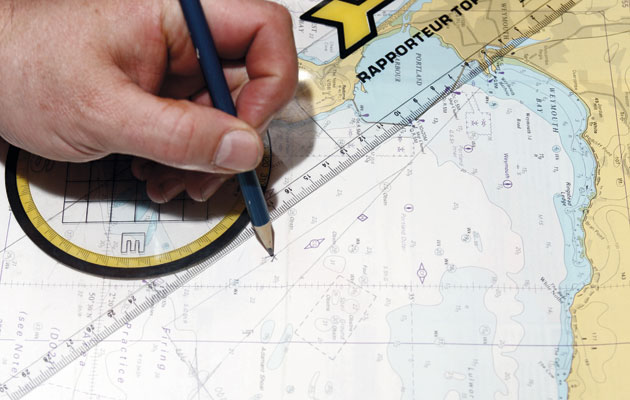
Your chartwork should be fluid and accurate
Skilled chartwork comes with use, and no amount of last-minute swotting can make up for weeks of doing it as a matter of course. Plotting traditional fixes is a good giveaway these days. With GPS all around us, we only do this for real when electronics fail. I’ve seen a person take 15 minutes to select three objects from a background studded with lights, then plot the results. The yacht had moved over two miles in the meantime…

It’s absolutely vital that you maintain a decent logbook during the exam
It’s absolutely vital, whether navigating with a giant chart plotter or a Walker log, that you maintain a decent log book. Without this, if GPS fails for any reason at all, you’re lost, Mate, so is your exam, and quite right too!
Take command
One of the most important questions on most examiners’ private lists is how good the candidate is at taking charge. If he’s managing well, we probably won’t even notice that he’s in command, that his crew all know what’s expected of them and that their skipper is quietly checking that they’re doing it. Good leadership is seldom about barking orders, and never about ignoring all on board, yet leadership is what being a Yachtmaster is all about. First, you must be sufficiently comfortable with your own skill levels not to have to worry about little things like picking up a mooring. Only then can you consider what may go wrong for the poor soul on the foredeck in a gale at midnight.
The classic skills
These are what most people imagine success in an exam is based upon. Actually, these basic skills merely help an examiner build up an overall picture of the candidate. It’s generally not a hanging matter if one manoeuvre goes a bit haywire. Even a grounding is often more interesting for what the candidate does about it than for the fact that it has happened. After all, nobody is perfect, especially under the stress of an exam.
Man overboard
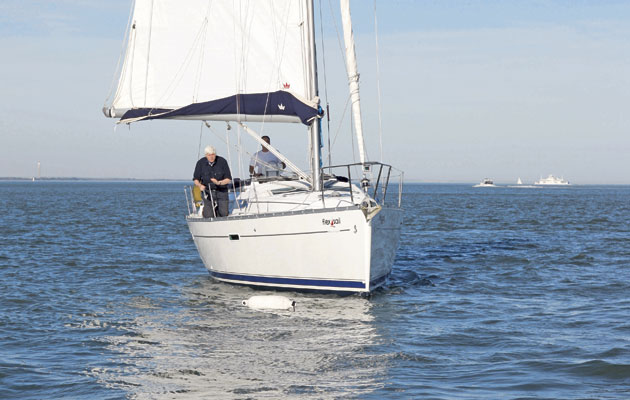
An effective, confidently executed man overboard drill speaks volumes about a candidate’s boat-handling ability but it’s not necessarily curtains if the manoeuvre goes a bit haywire
Errors in principle are not popular with examiners. Mistakes under pressure may sometimes be forgiven, and man overboard is a case in point. If the boat sails past the dummy with her mainsail full and the examiner asks, ‘What went wrong?’ It won’t get you much of a score if you reply, ‘I was going too fast.’
‘Candidate’s speciality, stating the bleeding obvious,’ the examiner will note on his pad, and move on, downhearted.
However, if you say, ‘I’m kicking myself because I was too far upwind and couldn’t de-power the main. I tried to get onto a close reach but I misjudged my approach,’ he’s more likely to take a lenient view – especially if you’ve opted for ‘Coastal’.
Securing the yacht alongside
When I was examining instructors regularly, I’d often sail up to Poole Quay (a tidal wall) shortly before closing time. I’d hop off the boat as soon as she touched the piling, saying, ‘You sort her out, skipper, I’m off for a quick pint.’ I’d then do just that. When I returned 10 minutes later, if the yacht was neatly snugged down with four lines ashore, ends on the dock, a fender board in place, sails neatly stowed and all hands below cooking and relaxing, the guy was in good shape for a pass. If I found discussions on deck about whether to ‘hand the end back for a spring’, and people blundering about in the dark, things didn’t look so bright for our hero. Have a system and know how to execute it.
… and don’t forget
Mooring and anchoring

Mooring and anchoring under sail should present no challenge to the aspiring Yachtmaster. When in doubt, drop the mainsail
These are Day Skipper skills that should pose no threat to a Yachtmaster candidate. Under sail, just remember first to assess whether the wind is with or against the tide. If you get lucky and it’s against, drop the main and arrive stemming the stream, spilling under headsail or creeping along under bare poles. If wind and tide are at all ambiguous, never forget the old adage – when in doubt, drop the mainsail.
Meteorology
As forecasting has become more comprehensive and accessible, I’ve noticed a reduction in candidates’ capacity to understand what’s going on and to read a bulletin creatively. Anyone who can’t describe the typical cloud sequence on a North Atlantic depression gets nil points from me, and failure to understand the basics of air masses is going to run up a black mark too. A favourite with examiners is to produce a weather map and invite their Yachtmaster to analyse it. Be ready, and know your subject.

Tom sees no reason not to have a chart in the cockpit, but some examiners disapprove of it. Be ready to justify your choice
Many candidates produce excellent pilotage plans for entering a strange harbour. I’m happy with that, and most examiners love it. Personally, I prefer to sketch a few notes on the actual chart and have it in the cockpit held down with a winch handle, yet I’ve met examiners who’d be horrified to see a chart on deck at all. So there you have it. Do what suits you best, then be ready to justify your choice. Actually, this advice is good across the board. The examiner wants to see what you really do, not some fantasy you’ve cooked up because you think he might like it. That is a weak candidate’s policy and it often backfires.

No shortcuts here, you just need to know your stuff – and finding the time to learn isn’t difficult
So far as the MCA is concerned, this is the crunch. Examiners are encouraged to demand high standards in this subject, and there’s no reason for a candidate, knowing full well he is to be put on the griddle, not to have the regulations burned into his heart. The best way to be exam-proof is to invest in A Seaman’s Guide to the Rule of the Road, available for modest money from all good chandlers or Bookharbour.com. Place it prominently in the heads some months before the exam and devote five minutes of the shining hour each day to digesting its wondrous contents. The book makes it easy and there’s no excuse for disappointing the Board of Trade!
For all the latest from the sailing world, follow our social media channels Facebook, Twitter and Instagram .
Have you thought about taking out a subscription to Yachting Monthly magazine?
Subscriptions are available in both print and digital editions through our official online shop Magazines Direct and all postage and delivery costs are included.
- Yachting Monthly is packed with all the information you need to help you get the most from your time on the water.
- Take your seamanship to the next level with tips, advice and skills from our expert skippers and sailors
- Impartial in-depth reviews of the latest yachts and equipment will ensure you buy the best whatever your budget
- If you are looking to cruise away with friends Yachting Monthly will give you plenty of ideas of where to sail and anchor
Impartial training and careers advice
Call us: +441983 280 641
+441983 280 641

Requirements for the Yachtmaster Offshore Exam
To sit the RYA Yachtmaster offshore exam, you are required to have the following miles and experience. All completed within the last ten years:
- A minimum of 2,500 miles are logged before you sit the exam. At least half the miles must be in tidal waters.
- Five passages over 60 miles long** . Two of these passages must have been at night, and two acting as skipper.
- 50 days at sea on yachts up to 500gt.
- At least five days experience as a skipper.
- A valid First Aid Certificate (If STCW, completed within the last 5 years)
- A GMDSS short-range VHF radio certificate.
** Note: All five passages must have been on a vessel between 7m and 24m in length.
Requirements for the RYA Yachtmaster Coastal exam
- 30 days at sea on a vessel less than 24m in length, and a minimum of 800 miles logged before you sit the exam. At least half the sea time must be in tidal waters.
- Two days as skipper, on a vessel less than 24m in length.
- 12 night hours.
- A valid First Aid certificate.
- You must be 17 years old at the time of the exam.
If you hold the RYA Coastal Skipper course completion certificate, then the miles required for Yachtmaster Coastal are reduced to 400.
What is considered tidal waters?
An area is deemed tidal if published stream, current or tidal range data is available, the influence of which is significant enough to require the effects to be taken into account to plan and execute a safe and efficient passage.
But, all my sea miles has been on a vessel OVER 24m….
Good news! The RYA accepts 50% (1,250) of your qualifying sea miles gained on a vessel over 24m.
It’s crucial to provide a Testimonial or Discharge book as proof of your 1,250 sea miles.
The other 50% (1,250 miles) must be from vessels between 7m and 24m in length.
Some Superyachts have large tenders and chase boats. In this case, any miles and qualifying passages gained at the helm go some way to 1,250 sea miles.
Do I need RYA Yachtmaster Theory?
Depends on your goal.
Technically, you don’t need it to sit your Yachtmaster Coastal or Offshore exam, however:
To become an RYA Yachtmaster, you need to be able to navigate using traditional and electronic navigation techniques. The RYA Yachtmaster Theory Course teaches you everything you need to know to navigate a yacht offshore and we recommend it to everybody thinking of sitting the RYA Yachtmaster practical exam.
RYA Yachtmaster Theory is a requirement for Officer of the Watch 3000GT.
At Flying Fish we combine both Yachtmaster Theory and a practical prep week into one course.
How do I convert from sail to power?
To convert from Yachtmaster offshore sail to power you must have completed, in the last 10 years:
- Minimum of 1,250 miles on a vessel between 7m and 24m in length.
- 25 days living onboard.
- 3 days as skipper.
- Three passages of over 60 miles, including one overnight and one as skipper.
How to record your miles.
Your experience would have been built up over some time on various types of yachts. The miles that you have gained on vessels between 7 and 24 meters in length in the past ten years can be recorded in either:
- RYA’s G158 logbook
- A CV detailing the information below
- An Excel spreadsheet
Please note, when recording your miles and experience, make sure you detail the following:
- Dates the passage/trip took place.
- Name and type of vessel
- Details of the passages
- Miles sailed on each passage
- Night hours
Flying Fish has created a personal log that you can use to record your sea miles.
What First Aid qualification do I need?
You must have a valid, in-date First Aid qualification to sit the RYA Yachtmaster Coastal or Offshore exam.
The RYA, STCW, and Seafish First Aid certificates are all accepted by the RYA.
How long are certificates valid?
The RYA First Aid certificate is valid for 3-years.
STCW First Aid certificates do not have an expiry date. However, It is accepted that after 5 years, our knowledge of CPR and other life-saving techniques tends to fade.
Therefore, the RYA requires holders of STCW First Aid to refresh every 5-years from the date of issue.
At flying Fish, we offer STCW Elementary First Aid courses that coincide with our Yachtmaster Power Theory and practical courses. If you need to update your STCW Elementary First Aid qualification, we invite you to click on the link below to book an update.
Commercial Endorsement
By commercially endorsing your Yachtmaster qualification, you not only meet the necessary requirements for taking paying passengers on a commercial vessel but also equip yourself with the confidence and readiness for professional opportunities.
Superyacht tenders are usually registered as a “tender too” the larger yacht, and in most cases, Commercial Endorsement is not required.
Many individuals choose to endorse their RYA Yachtmaster for commercial use. This endorsement prepares you for potential opportunities, such as working as a professional skipper. If this is your goal, in addition to First Aid and VHF, you will need the following:
- Either an ENG1 or ML5 medical
- STCW or RYA Sea survival certificate
- Complete the RYA’s online PPR course
Once you have completed these three steps, you can apply for commercial endorsement through the RYA.
Upgrade to RYA Master 200 GT
Complete STCW Basic Safety Training , then the RYA/MCA Yachtmaster Offshore certificate will be endorsed to allow the holder to skipper a commercial or privately owned vessel up to 200 gross tonnes, which may be greater than 24m in length.
What other skills do I need before I join a prep course?
If you are considering a Yachtmaster Prep course then Flying Fish will provide some pre-course reading. If you did some background reading before your prep course, it would help if you had a good knowledge of the following:
- I.R.P.C.S (rules of the road) and distress signals.
- Weather. The passage of frontal depression, sea breeze, fog, effects of wind and tide, and terminology used in a weather forecast.
- Navigation. Understand how to calculate tidal heights, course to steer, and estimated position.
- Ability to tie the basic knots.
- Have knowledge of Radar, rule 19, and how to use it for collision avoidance.
- The G158 logbook provides all sea time requirements and a section where you can record all your sea time.

RYA Yachtmaster Offshore / Yachtmaster Coastal / Master of Yachts 200 Course 300
MPT is the most complete full service private maritime school in the country and has been training mariners since 1983. Our Fort Lauderdale based campuses host over 45,000 square feet of classrooms, deck and engineering training labs, the Ship's Store, and student service facilities.
Preparing for RYA Yachtmaster Offshore / Yachtmaster Coastal / Master...
Course description.
Yachtmaster Certificate of Competency
The Yachtmaster Qualification is the pinnacle of the RYA (Royal Yachting Association) Training and Certification System. It is widely recognized throughout the world as a prestigious accomplishment.
Holding this credential can:
- Improve your resume for any deck department position on yachts - Serve as prerequisite training for an MCA OOW 3000 GT CoC - Professional Development in your yachting career - Serve as your Certificate of Competence (CoC) for operators of yachts up to 200 tons
The Yachtmaster Course should be undertaken by crew aspiring to advance to the MCA OOW level up to 3000 tons and by those who are advancing to the command level for Master of Yachts up to 200 tons.
2 Routes Available – Same Course:
Yachtmaster Coastal Yachtmaster Offshore
Yachting professional candidates are encouraged to start their training and professional development as early in their career as possible. Many will take their STCW Basic Safety Training Program (#140) and then when they qualify, it is recommended to obtain the Yachtmaster Coastal CoC. Candidates wishing to upgrade to the offshore route later can simply examine, without additional required training.
Whether you qualify for the Yachtmaster Coastal or Offshore, the training is the same. The only difference is your experience and practical skill level. You will be examined towards whichever level you qualify for.
The MPT Yachtmaster Coastal and Offshore Course (#300) is taught on a Motor Yacht and the practical training and examination are towards a Motor Certificate of Competence. (If you are applying for a Sail Endorsement, this course will not satisfy your practical training and exam requirements). All sea time must be on a power boat and not on a sail boat under power. The Theory, SRC, PPR, and Basic Training courses are the same for both schemes.
The MPT Yachtmaster advanced level certification is available in a 2 week + exam program combining shore-based theory and practical hands-on techniques for a Motor Vessel and the RYA Practical Examination. The first week of class is in the classroom (theory) and the second week is Practical, out on the boat. In addition, there will be class on Saturday of the first week so please plan accordingly.
YACHTMASTER COASTAL & OFFSHORE Subjects Include:
One week (40 hours) of comprehensive shore-based theory module with written assessment papers including navigation, tidal calculations, international and inland rules of the road, coastal pilotage, meteorology, anchoring and mooring, docking and undocking, buoyage systems, safety, voyage and passage planning, general ship knowledge and seamanship. A theory examination will be conducted after the completion of the 40-hour theory portion of the program.
One week of Yachtmaster Offshore/Coastal practical training is conducted on board one of MPT’s Yachts. These yachts are up to 48’ and are twin screw motor yachts. This part of the instruction covers seamanship skills such as nautical terms, tides, marlinespike seamanship, anchor work, boat handling, docking, general yachting skills, basic weather, navigation and passage planning. This course will be a preparation course for your final Yachtmaster Coastal/Offshore Examination. The practical portion of the course will be conducted during daytime, evening and occasionally may include weekend hours.
The Yachtmaster Course #300 is an Advanced Review Course and it is assumed that candidates will have the prerequisite knowledge of the Basics of Navigation and recommended to the level of RYA Day Skipper, and the very least, the level of the Essential Navigation On-line course. To increase your likelihood of success, we recommend taking the online pre-course - ESSENTIAL NAVIGATION. Additionally, flash cards are available in the MPT Ship's Store for rules study in lights and shapes. Also, many Apps are available to assist in these subjects for pre-study. It is also strongly advised that you pick up your study material well in advance of the start of your course. Pre-study is essential for a successful outcome of this course.
The RYA Yachtmaster course is accredited by the RYA and MCA and recognized for service as Captain or Mate (OOW) up to 200gt up to 150 miles from a safe haven, at the Offshore level or up to 60 miles from safe haven at the Coastal level.
The Yachtmaster CoC meets the STCW A-V1/1 and section A V1/1-4 when combined with Basic Training Courses. Yachtmaster Offshore fulfills the prerequisite for MCA OOW 500 and 3000 GT and the MCA STCW A-II/2 Command Certificate for Master 200GT.
Sea Service Prerequisites (minimums): Note you must be able to provide proof of your sea service before undertaking the exam. This should be provided at least 2 weeks before the course when possible to allow our team to review it and ensure your eligibility for the course. Speak to your MPT Career Counselor or your instructor for assistance.
Sea Service can be proven by submitting one or more of the following:
- Log book (RYA or other acceptable)
- Sea Service Testimonial Letters from captains, owners or operators of vessels outlining vessel specifics, time underway, your capacity served onboard and the location of the service (tidal or non-tidal waters, etc).
- Sea Service Forms (calendar style - provided you can supply all of the additional information such as number of miles, etc.) Method 2 is preferred.
Yachtmaster Coastal: Motor - Option 1
Without RYA Coastal Skipper Practical certificate:
- 2 days as skipper on vessels of less than 24 meters
Note: No more than half of the required miles can be on vessels over 24 meters
Yachmaster Coastal: Motor – Option 2 A & B
With RYA Coastal Skipper Practical Certificate:
Can be used to enter OOW 3000GT program and modules
A. Mariners with Coastal Skipper Practical Certificate and with more than half of required sea service on vessels less than 24 meters
- 20 days on board
- 2 days as skipper on vessel less than 24 meters
B. Mariners with Coastal Skipper Practical Certificate and with more than half of required sea service on vessels greater than 24 meters
- 30 days on board
Yachtmaster Offshore: Motor
- 50 days sea time overall on motor vessels
- 5 days in the command position on the vessel (as Master)
- 2500 nautical miles logged with half transiting through tidal waters and half on a vessel of less than 24 meters that is not a tender.
- 5 passages over 60 nautical miles, including 2 overnight and 2 in command (as Master) of vessel.
Yachtmaster Ocean:
- Obtain Yeachmaster Offshore
- Complete the RYA astro/ocean shorebased theory #306
- Ocean passage of 600 nautical miles or more as captain or mate
- Complete oral exam with RYA examiner successfully
For Commercial Endorsement:
In addition to the SRC and First Aid (must have been taken within 5 years) you will need to obtain an MCA Certificate of Medical Fitness (ENG-1) as well as the Personal Survival Training (4 Modules of STCW 210) and the online Professional Practices & Responsibilities (PPR) Certificate. If you are planning to work commercially, you should simply add the STCW Basic Training Program, which will include the approved Personal Survival and First Aid automatically and will also allow your Yachtmaster CoC to have the STCW endorsement as well. Most boats internationally require this of all crew working commercially. We also recommend the Security Awareness or Designated Security (VPDSD) Course if you are working commercially as well. These are all separate fees from the Yachtmaster Course however MPT offers Package discounts, speak to an MPT RYA Specialist for more information and assistance. There is also a fee candidates will pay to the RYA for the commercial endorsement.
Written & Practical Exam Information:
The written exams are administered at MPT at the end of the shore-based theory segment of your program. They include all of the topics covered in the course. All of the shore-based courses and experience criteria must be fulfilled before the RYA Examiner will conduct the practical assessment. The final exam will be conducted by an independent and unbiased RYA Yachtmaster examiner and takes the form of an extensive oral and practical examination on a motor yacht. Candidates who have taken MPT's Yachtmaster course may use one of the MPT vessels for the exam at no additional fee. The practical exam will take an additional one-two day and is scheduled when the examiner is available and generally immediately after the course, weather permitting. Once your eligibility has been reviewed (sea time and prerequisites met), the schedule for the practical examination is predicated on several things:
1)The weather as this is a practical underway examination 2)The availability of the RYA Examiner (this is not an MPT employee)
Examinations may need to be scheduled for additional days which may not be consecutive to the dates of the course.
Exam Subjects:
We will review with you the knowledge-based subjects during your shore-based theory week and also fine tune your boat handling skills during your practical course, but you should be familiar with the following areas when you join the class and proficient by the exam date. (Note if you are not already well versed in these subjects when you arrive, you are strongly encouraged to take the Essential Navigation (online course) as there is not sufficient time to cover the basics in the 2-week program. Ask about #333)
- Knowledge of the International and Inland Rules of the Road.
- Safety. The candidate will be expected to know what safety equipment should be carried on board a yacht.
- Boat Handling, Maneuvering, Docking: Yachtmaster Coastal students will be expected to answer questions & demonstrate ability in simple situations only. Yachtmaster Offshore candidates are expected to demonstrate ability in more complex situations and will also be expected to show a higher level of expertise.
- General seamanship, including maintenance.
- Responsibilities of the skipper
- Navigation, Basic Weather
- Radio Communication & Signaling
- Command presence, management and direction of crew.
- Essential Navigation (online course)
Practical Exam Fees:
The RYA Examination Fee for the initial examination will be paid by MPT as part of your course tuition. Additional RYA fees are paid by candidate if a subsequent examination is needed.
If at the end of your course you wish to postpone the practical exam date, you are permitted to return for exam and RYA exam fee paid by MPT, within one calendar year, space permitting.
Additional Recommended or Required Courses:
- Essentials of Navigation (Online Pre-Course) #333
- First Aid & CPR #143 or Take STCW Basic Safety Training #141, 142, 143, 144
- SRC VHF Radio License #303 Required (offered Online) or GMDSS GOC #404
- RYA PPR (Professional Practices & Responsibility) #335 ONLINE COURSE
- MCA Approved Engine Course #440
- USCG Radar Course #148 & ARPA Course #150 or MCA Nav/Radar/ARPA Course #402
If you have three years of yacht service, speak to a career counselor about continuing straight through your OOW or Chief Mate 3000 GT program.
Required Materials
RECOMMEND PRE-STUDY: Essential Navigation online, course #333, COLREGS Study Apps or flashcard, and course notes. AVAILABLE IN MPT SHIPS STORE or bring with you the following: Pencil (mechanical or #2) Paper Chart Eraser (We recommend white- like magic rub or Staedtler), Navigation Tools (parallel rules/Portland plotter/triangles – your choice), Dividers (we recommend two- one as divider and one as compass), Calculator (we recommend the TI-30x), Hand Bearing Compass - optional though recommended (We recommend Weems & Plath #2004). Pick up at MPT when you register or when you check-in: Yachtmaster Shore based Training Manuals & Charts (provided by MPT).
11 day class in Fort Lauderdale
RECOMMENDED PRE-STUDY: Available at MPT Ships Store Complete Course Training DVD Flashcards AVAILABLE IN MPT SHIPS STORE OR BRING WITH YOU: Pencil (mechanical or #2) Paper Chart Eraser (We recommend white - like magic rub or staedtler) Navigation Tools (parallel rules/Portland plotter/triangles - your choice) Dividers (we recommend two - one as divider and one as compass) Calculator (we recommend the TI-30x) Hand Bearing Compass (We recommend Weems & Plath #2004) PICK UP AT SCHOOL WHEN YOU REGISTER OR WHEN YOU CHECK-IN: Yachtmaster Shorebased Training Manuals & Charts (provided by MPT)
Course Photos

Testimonials
Not suggestions. Thanks for letting me be your student! Alejandro, Friday August 2015 RYA Yachtmaster Offshore / Yachtmaster Coastal / Master of Yachts 200
A bit more time would be nice! But Steve was an awesome instructor.Very easy to follow and very thorough. Arthur, Wednesday November 2013 RYA Yachtmaster Offshore / Yachtmaster Coastal / Master of Yachts 200
1915 South Andrews Avenue, Fort Lauderdale, FL 33316, +1-954-525-1014 | +1-888-839-5025 (Toll Free)
Site map | privacy notice | cookie policy | accessibility notice, 1915 south andrews avenue, fort lauderdale, fl 33316 +1-954-525-1014 +1-888-839-5025 (toll free).

RYA Yachtmaster Offshore
Find out About the Yachtmaster Offshore Theory & Practical Training, (both Online & Shorebased)
Use the global Yachtmaster Offshore Directory to Find a Course Near me (Select any Location)
Page Navigation
- RYA Yachtmaster Offshore 200GT
- RYA Yachtmaster Offshore Requirements
- Course Breakdown
- RYA Yachtmaster Offshore Limited Theory
- RYA Yachtmaster of Yachts Practical Course
- RYA Yachtmaster Offshore Practical Examination
- RYA Yachmaster Offshore Certificate
- RYA Yachtmaster Offshore Commercial Endorsement
RYA Yachtmaster Offshore (Yachtmaster 200GT & 150NM Limited)
An RYA Offshore certifies an individual as competent to captain a vessel up to 24m in length and no more than 200 Gross Tonnes. The offshore certification is applicable passages during which the yacht is no more than 150 miles from harbour.
The Yacht master offshore consists of two components:
- Yachtmaster Offshore Theory
- Yachtmaster Offshore Practical
Both components can be done on an individual basis but in order to achieve a commercial endorsement for the yachtmaster offshore certificate of competency, both the theory and practical examinations must be passed.
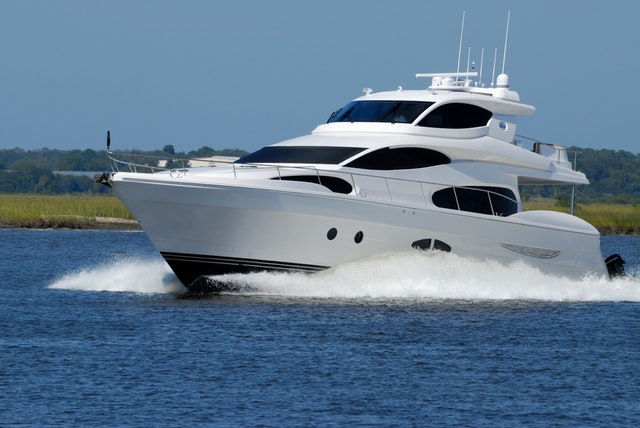
Yachtmaster Offshore Requirements:
In order to be eligible to take the Yachtmaster Offshore practical exam, candidates must meet the minimum sea time requirements.
The RYA Yachtmaster Offshore minimum sea time prerequisites are as follows:
- 50 days at sea on yachts up to 500GT
- 5 days as skipper on vessels less than 24m LOA
- 2500 miles on yachts up to 500GT
- 5 passages over 60 miles long, which must include 2 overnight passages and 2 as skipper
If a candidate already holds an RYA Yachtmaster Offshore Certificate of Competence for a different vessel type (Ie. power or sail) then the above prerequisites are adjusted as indicated on the RYA's Yacht Master Offshore Exam page.
Yachtmaster Offshore Course Breakdown
The Yachtmaster Offshore course consists of a 40-hour (minimum) theory course (excluding exam time), 5 days of practical training and preparation followed by a 2-day practical examination.
Yachtmaster Offshore Theory:
The following topics are covered during the Yachtmaster Offshore theory course:
- Position fixing,
- Course shaping and plotting,
- Tidal knowledge,
- Use of almanacs and admiralty publications,
- Electronic position finding equipment,
- Taking and interpreting forecasts,
- Plotting weather systems,
- Weather predictions using a barometer.
- Certificate issuing criteria
Yachtmaster Offshore Theory Online
The RYA Yachtmaster Offshore Theory can be studied in an online or virtual distance learning format. The online version of the course allows students to work through the training content at their own pace, which may benefit those who are working with little time off.
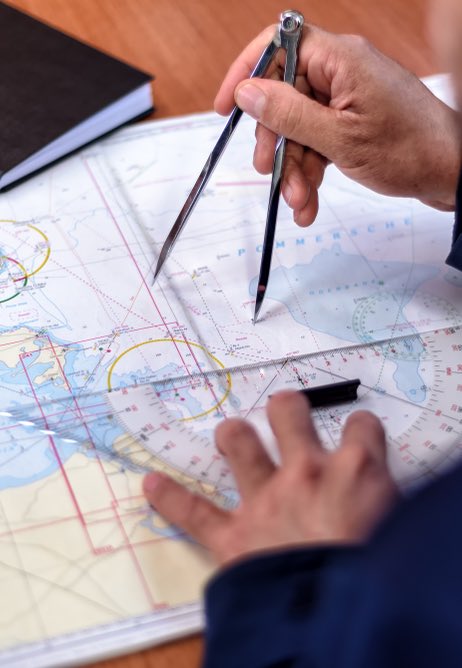
Yachtmaster Offshore Practical
Although there is no formal training course leading up to the RYA Yachtmaster Offshore Practical exam, it is common for yacht crew to complete a practical training course, leading up to the exam. This may vary slightly between schools but should be done at an RYA accredited center.
The exam will include an assessment of your skippering skills, boat handling, general seamanship, navigation, safety awareness and knowledge of the IRPCS, meteorology and signals.
RYA Yachtmaster Offshore Practical Exam:
A valid GMDSS-approved SRC Radio Operators Certificate and a First Aid Certificate are requirements for the RYA Yachtmaster Practical examination. The Elementary First Aid Certificate as acquired during STCW Basic Training is an accepted version. For recreational sailors, an RYA First Aid certificate is sufficient.
In addition to this, candidates need to ensure that they have met the minimum sea time prerequisites as highlighted above.
Practical Exam Assessment:
The exam will include an assessment of:
- The candidate's skills as a captain,
- Boat handling ability
- General seamanship,
- Navigation planning and execution
- Safety awareness and procedures
- Knowledge of the IRPCS,
- Meteorology,
- Lights, shapes, sounds, and other signals.
Practical Exam Duration:
- 8-12 hours for 1 candidate,
- 10-18 hours for 2 candidates.
- No more than two candidates can be examined in 24 hours and no more than four candidates can be examined in one 2-day session.
RYA Yachtmaster Offshore Certificate
Students who pass their Yachtmaster Offshore practical and theory examinations will be awarded an RYA Yachtmaster offshore certificate of competency. It is important to understand that CoC is a recreational license until it is commercially endorsed by the MCA.
RYA Yachtmaster Offshore Commerical Endorsement
In order to commercially endorse your Yachtmaster offshore certificate, you will need to submit the following:
- Original Yachtmaster Offshore certificate
- RYA Professional Practices and Responsibilities certificate
- an RYA commercial endorsement application form
- Your original, completed ML5, ENG1 , or an ENG1 equivalent medical form.
- A copy of your RYA Basic Sea Survival certificate or STCW Personal Survival Techniques
- A copy of your RYA Marine Radio SRC Certificate or other acceptable GMDSS Marine Radio Operator's Certificate .
- A passport-sized photo with your name on the back
- The application fee
RYA Yachtmaster Offshore License
A license card/ book will be provided to those who pass the relevant Yachtmaster offshore examinations. The license will include a photo, and details about the license holder, and will also include information about the endorsements associated with the license.
RYA Yachtmaster Offshore Training School Locations
Brazil Sao Paulo
Croatia Split
Greece Corfu
South Africa Cape Town Langebaan

Spain Barcelona
Turkey Marmaris
United Kingdom England Ireland Scotland
West Indies Antigua
Username or Email Address *
Remember me Lost your password?
Username or Email
Get New Password

RYA Yachtmaster Offshore Motor – Everything You Need to Know
| Time | 8 to 48 hour exam (dependant on the number of people) after a potential prep course of up to 5 days |
| Prerequisites | 50 days spent at sea 2500nm cruised, with at least 50% in tidal waters 5 days as skipper 5 60nm passages, 2 as skipper |
| Min. Age | 18 |
| Exam | 8 hours to 2 days on the water |
| Aim | To work commercially on a sailing vessel under 24m in length within 150nm of a harbour. |
The RYA Yachtmaster Offshore Motor ticket is considered the most useful and credible of all motor cruising qualifications. Administered on behalf of the UK Maritime and Coastgaurd Agency by the RYA the qualification is accepted as a worldwide standard. To gain an RYA Yachtmaster Offshore Motor qualification you must sit a practical exam.
What Does the RYA Yachtmaster Offshore Motor Allow You to Do?
Gaining an RYA Yachtmaster Offshore Motor will allow you to work commercially on motor vessels not exceeding 200GT.
The RYA Yachtmaster Offshore Motor exam certifies that you are competent to skipper a motor yacht on any passage that is not more than 150nm from a harbour.
How Can You Sit an RYA Yachtmaster Offshore Motor Exam?
The exam can be organised via the RYA to be done on your own vessel or via an RYA training centre, to be done on an RYA training vessel. It should be noted, that to complete the exam on your own vessel, your vessel must be up to an appropriate safety standard.
Most RYA training centres offering the RYA Cruising Scheme offer some form of pre exam preparation or coaching for those looking to take an RYA Yachtmaster Offshore Motor exam.
These courses are often referred to as ‘RYA Yachtmaster Prep’ courses. This is unique within the RYA training framework in that it does not have a fixed course syllabus, length or course completion certificate.
Who Can Do an RYA Yachtmaster Offshore Motor Exam?
The RYA Yachtmaster Offshore Motor exam is open to anyone who meets the minimum criteria, with all experience within the last 10 years.
- 18 years of age or older
- 50 days spent at sea
- 2500nm cruised, with at least 50% in tidal waters
- 5 days as skipper
- 5 passages of over 60nm, with at least 2 as skipper
If you have skippering experience but not the required days or passages, then the RYA Yachtmaster Coastal Motor might be for you.
If you have the miles, but not the skippering experience, then again, the RYA Yachtmaster Coastal Motor might be for you.
Additionally, exam candidates must also hold a relevant GMDSS VHF certification and an RYA First Aid certificate or recognised equivalent.
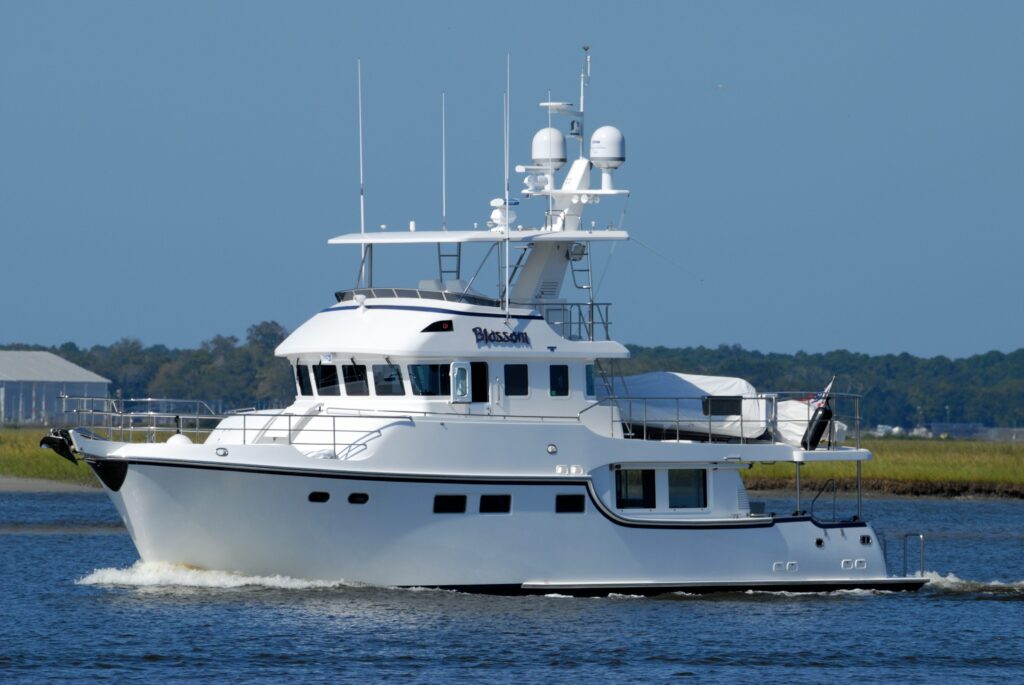
Can You Go Straight to the RYA Yachtmaster Offshore Motor Course and Exam?
You can indeed jump straight into the RYA Cruising Scheme at this stage, however, it is imperative that you understand the levels that are required of you, both in your knowledge and practical skills.
It is suggested that as a minimum you have completed (and passed) the RYA Coastal Skipper and Yachtmaster Theory course as the knowledge in here is both required for you to be at the level required, but will be formally tested during your RYA Yachtmaster Offshore Motor exam, both orally and in practical applications.
What Do You Need to Know before Attending an RYA Yachtmaster Offshore Motor Course and Exam?
You, of course, need to be a suitably experienced skipper and this involves meeting the prerequisites mentioned above to be eligible. You should be able to handle your vessel competently in close quarters and at sea. You should be comfortable applying this in various day and night time passages.
As mentioned, it is strongly recommended to have completed the RYA Coastal and Yachtmaster Theory as the depth of knowledge gained from this shore based course will be tested throughout your exam.
How Long Does an RYA Yachtmaster Offshore Motor Prep Course and Exam Take?
The exam can take anything from 8 hours to 2 days depending on how many candidates are being examined on one vessel at a time. Up to 4 candidates can sit the exam at once and this would last for a maximum of 48 hours if so.
An RYA Yachtmaster Prep course is generally four and a half days long and is usually directly followed by the practical exam.
Is There a Set Syllabus for the Prep Course?
No, this is the one time that while there is a recognised ‘course’, there is no syllabus. It is up to the experienced instructor on the RYA Yachtmaster Offshore Motor Prep course to tailor the learnings to your needs. This is more about refining your skills rather than teaching new ones.
You should be honest with yourself and your instructor in order for learnings throughout the week to be tailored to improve yourself on any weak areas that you may have.
What Should I Expect from a Prep Course?
These courses run as a standalone course and while there may be students on another course, generally everyone onboard is a candidate for an RYA Yachtmaster Exam. The courses should however be run with no more than 4 students on board.
The content will depend on the needs of all students and is aimed at fine-tuning existing skills rather than teaching new ones. This will involve a lot of night time cruising and navigation, carrying out challenging boat handling while using theory knowledge and ensuring general skippering skills are up to scratch.
There is a basic syllabus that is used to help shape the exam content, but in reality, you can be tested on anything from the RYA cruising scheme within the exam.
Before choosing the RYA Yachtmaster Offshore Motor Prep course you need to be honest with yourself and your own abilities. While on the course you need to take on the advice and guidance given by the instructor on what areas need work. If you speak to your instructor before the course, they can tailor the instruction to your needs.
What Should I Expect on an RYA Yachtmaster Offshore Motor Exam?
On the exam, you will be given the opportunity to demonstrate your knowledge and competence. You will be expected to take full responsibility of your vessel and crew. The examiner will be looking for you to demonstrate competence and show your broad range of experience.
The exam will be an intensive experience and even when you are not the designated skipper, you will still be asked questions and observed and examined as a participant of the crew.
During the exam you will be asked to complete various tasks, ranging from leaving the dock, skippering a short passage, casualty recovery, night pilotage and even blind navigation. Additionally, you will be tested on theoretical aspects such as how to deal with an engine failure, knowledge of your vessel’s stability, meteorology and IRPCS.
As a potential RYA Yachtmaster Offshore Motor, these tasks are ones that should now be second nature to you and should take minimal time to plan while the theoretical knowledge should be able to roll off your tongue.
What Is the RYA Yachtmaster Offshore Motor Exam Syllabus?
The following topics make up the basis for the RYA Yachtmaster Offshore Motor exam syllabus. IRPCS, safety, boat handling, seamanship, responsibility as skipper, navigation, meteorology and signals.
But, as mentioned above, anything from the whole RYA cruising syllabus scheme can be tested.
What Is the Cost of an RYA Yachtmaster Offshore Motor Course and Exam?
As ever, many schools differ in price. We would recommend that you take a look around at the various options and find what suits your needs the best. Cheapest is not often better.
This can range from knowing if you will have to share a cabin while onboard to whether food and berthing charges are included to how many other students you will be sharing your week with.
The exam fee is usually not included, which is currently £231.

Where Should I Do My RYA Yachtmaster Offshore Motor?
As always there are many thoughts and pros on cons on this, and as a potential RYA Yachtmaster Offshore Motor you should consider yourself experienced enough to sit the exam anywhere. However, if you choose to sit the exam in an area that you are familiar with then you will take a little bit of the stress out of learning a new area and start with a small advantage of having that all important local knowledge at your disposal.
What Happens If I Struggle on thePrep Course?
Your instructor should be able to update you on your ability levels throughout the course. They will be highly experienced and it is suggested that you listen to their advice given.
If you are learning something for the first time you should consider if you are ready for the exam. Talk to your instructor and they will be able to guide you on if you are ready for the exam, if they would advise further training or if they recommend that you aim for the RYA Yachtmaster Coastal Motor exam instead.
What Is the Pass Mark for the Exam?
There is no pass mark as such and the examiner will be looking to see that you are a competent and complete skipper, capable of looking after both your vessel and crew in a safe manner.
Every exam is different and no examiner will be setting out to fail any candidates, but they must ensure and check that each candidate is able to demonstrate their ability, knowledge and skills in a safe and timely manner.
If you were to fail to reach the levels of an RYA Yachtmaster Offshore Motor certificate of competence then the examiner will give you a thorough debrief complete with action points to work on before you have another attempt at the exam.
What Comes After RYA Yachtmaster Offshore Motor?
After completion of the exam, you will have gained the highly sought after RYA Yachtmaster Offshore Motor certificate of competence and you can get this commercially endorsed by adding a sea survival certification, a personal medical and a PPR course, all of which, along with your GMDSS VHF and First Aid should be sent off to the RYA for certification upgrade. This will now allow the holder to skipper a vessel commercially, so long as it is less than 200 gross tonnes, up to 150nm from a harbour.
The next step is of course to get out on the water and to keep learning, keep gaining experience and keep improving on the skills and knowledge learned so far. No skipper is the finished article and we should all keep seeking to improve.
Within the RYA cruising scheme, there are a couple more steps that are possible. This is to progress and upgrade your RYA Yachtmaster Offshore Motor certificate of competence to an RYA Yachtmaster Ocean Motor certificate of competence.
To do this there is 3 main steps, first, you will need to complete an RYA Yachtmaster Ocean Theory course, where you will learn about astro navigation, ocean meteorology and ocean navigation, join the waiting list for our ocean theory course here . Next, is to complete an ocean qualifying passage that meets the necessary requirements. Finally, you will then need to complete another exam, this time an oral exam, where you will discuss your ocean qualifying passage and general ocean skippering skills.
On successful completion of this, you will be awared the highest accolade within the RYA cruising scheme, the RYA Yachtmaster Ocean Motor certificate of competence.
One other direction of travel is to become an RYA Cruising Instructor for Motor. To do this, you will first want to consolidate your skippering skills and knowledge then look to come back and start off with an RYA Cruising Instructor course. On this course, RYA Instructor Trainers will assess and guide you through what is required and expected to work as an RYA Cruising Instructor for Motor.
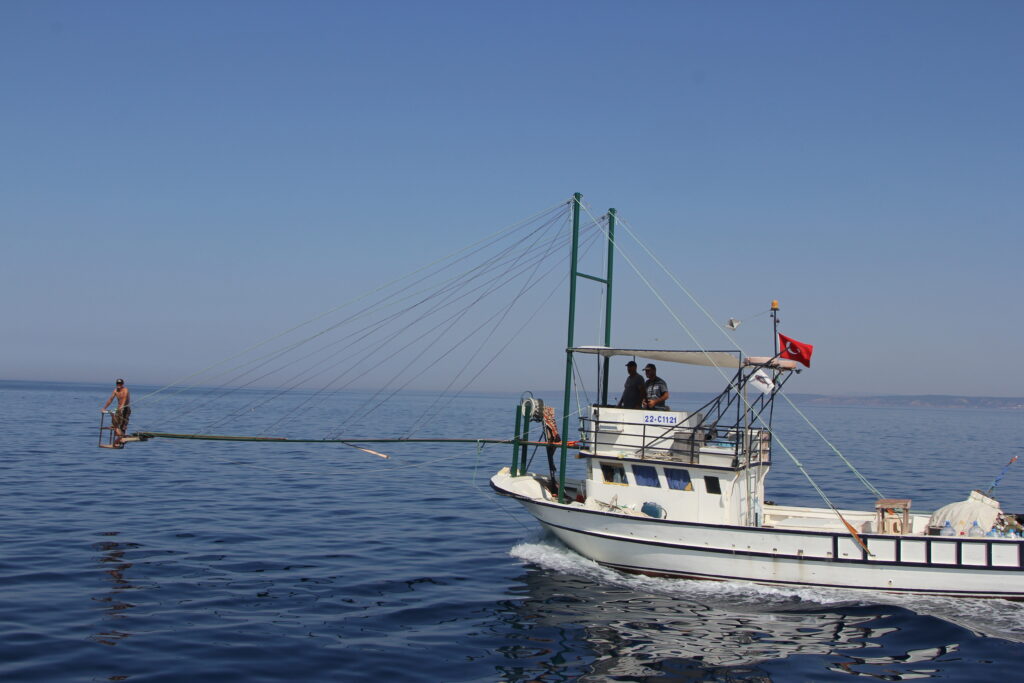
Releated Posts
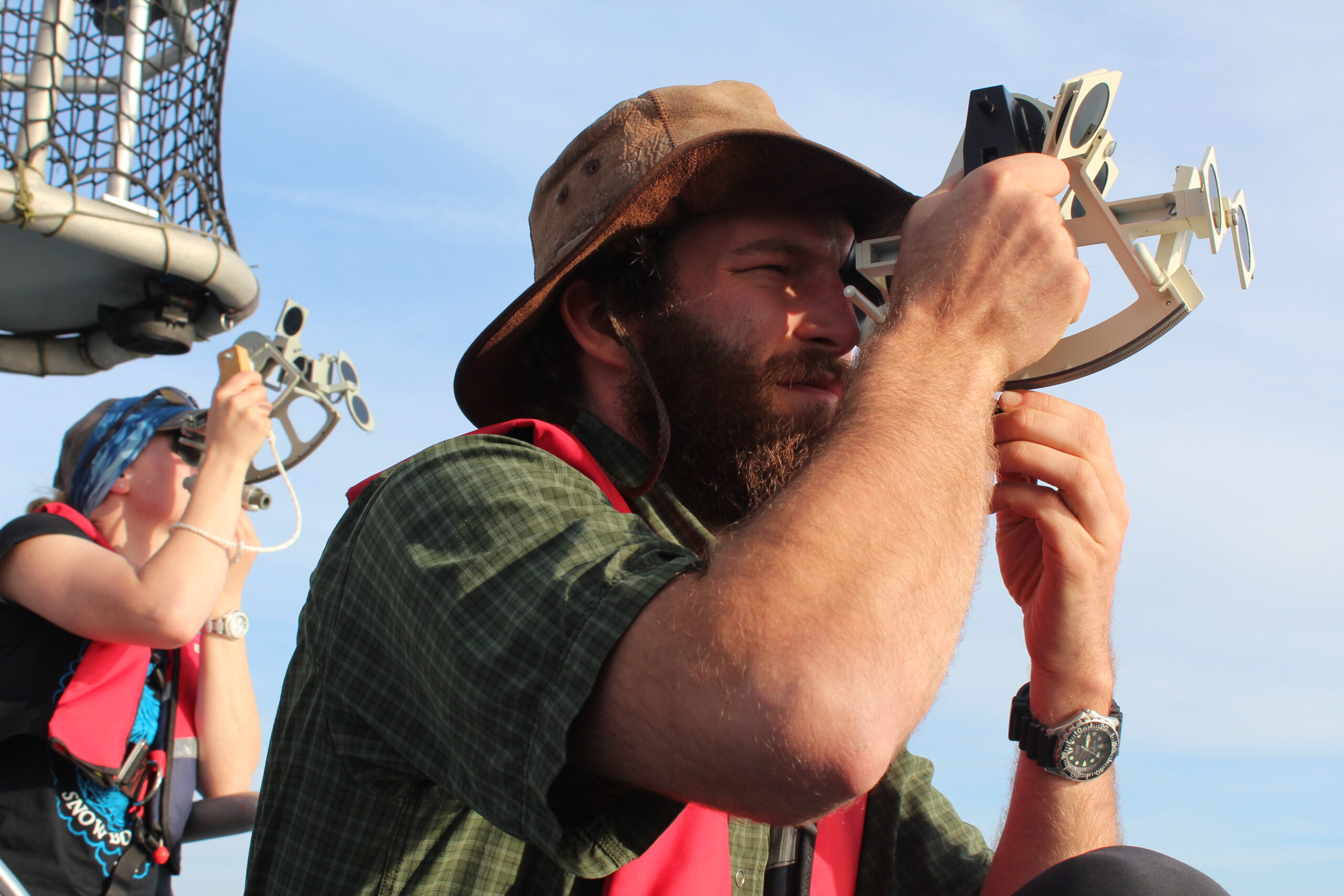
RYA Yachtmaster Ocean Theory – Everything You Need to Know
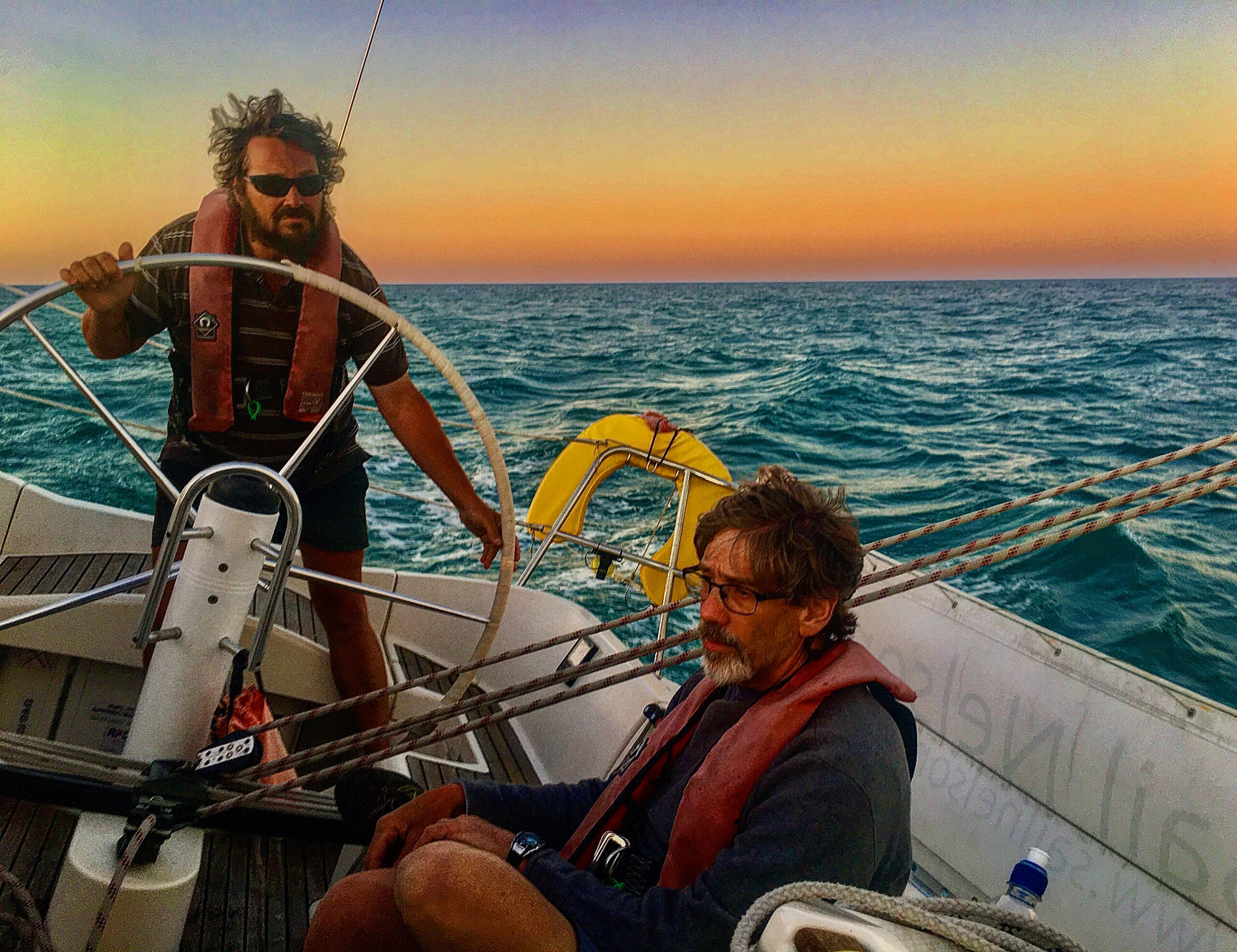
RYA Yachtmaster Offshore Sail – Everything You Need to Know
Your Comment*
Save my name, email, and website in this browser for the next time I comment.

Chieftain Training
RYA & STCW Courses – Sail, Power, Super-Yacht & Workboat
What is an Ocean Yachtmaster
What is an ocean yachtmaster and how to become an ocean yachtmaster.
The RYA/MCA Ocean Yachtmaster Certificate of Competence (CoC) is the highest level certificate in the RYA scheme. It can be used by blue water leisure sailors and by commercial skippers and crew. Under the MCA Codes of practice the Ocean Yachtmaster Certificate of Competence holder, (with relevant commercial endorsement etc.) can skipper a vessel;
- Up to 200 tonnes
- Carrying up to 12 passengers
- Anywhere globally (i.e. beyond the 150 miles from a safe haven limit imposed upon a Yachtmaster Offshore ).
Furthermore the Yachtmaster Ocean CoC Exam is required for the Chief Officer 3000 Certificate of Competence (for yachts over 200 tonne).
There are 5 stepping stones to becoming an Ocean Yachtmaster CoC holder. Steps 1-4 can be taken in any order although the order presented below is the most logical. Step 5 can only be completed once the first 4 steps have been completed.
- Yachtmaster Offshore Certificate of Competence
RYA Ocean Yachtmaster Shorebased Course
Ocean qualifying passage.
- Sights and Compass Check by sextant at sea
RYA/MCA Ocean Yachtmaster Certificate of Competence Oral Exam
It is technically possible to take the Ocean Yachtmaster CoC Oral exam without having previously completed the RYA Ocean Shorebased Course but not advised as it involves an additional written exam and you would require all of the relevant knowledge taught on the course. Further information is detailed the relevant 5 steps below;

Becoming a Yachtmaster Offshore Certificate of Competence Holder
While you can proceed towards the RYA Ocean shorebased course and the Ocean practical steps (qualifying passage and sights) you can not proceed to the Oral exam without first holding the Yachtmaster Offshore Certificate of Competence .
This is a 40-hour theory course. It can be taken;
- Over 5 consecutive days face to face in the classroom
- Over 13 evenings face to face night school in the classroom
- Over 5.5 days face to face using zoom
- Online in your own time.
Whichever format you choose the course culminates in a written paper.
The course concentrates on astro navigation, i.e using a sextant and the heavenly bodies (sun, moon, stars and planets) to fix your position. The course also devotes time to ocean voyage planning and worldwide meteorology.
Full details can be found at Ocean Yachtmaster Shorebased Course

While you don’t strictly need to be a Yachtmaster Offshore before taking the Ocean Yachtmaster Shorebased Course , the following knowledge is assumed before the Ocean Shorebased course starts;
- Use of plotting instruments (plotter, dividers etc.)
- Latitude and longitude, knots and nautical miles
- Variation and deviation
- Application of UT, DST
- 2/3 Point fixes and angles of cut
- Dead Reckoning / EP (and ideally the Running Fix)
- GPS and other electronic nav aids
- Coastal/offshore voyage planning
- Sources of forecast information
- Synoptic charts
- Low pressure systems
- Coastal communications /distress comms. (Navtex, VHF, EPIRBs and SARTs)
Is the Ocean Shorebased Written Exam Invigilated?
If you take a face to face Ocean Yachtmaster Shorebased Course then the written paper is invigilated and marked by your Instructor.
If you choose to take the Online or Webinar RYA Ocean Yachtmaster Shorebased Course then face to face invigilation may be required (see table below).
| I am taking the course for fun/ and/or for my own interest | Invigilation not required |
| I intend to use the knowledge for leisure sailing | Invigilation not required |
| I intend to use this course as a pre requisite for the RYA/MCA Ocean Yachtmaster Certificate of Competence Exam | required by an RYA Instructor, otherwise you will be required to complete a written exam at the time of your Ocean Yachtmaster Certificate of Competence Oral Exam |
| I intend to use this certificate as a pre requisite for the | required by an RYA Instructor |
| I intend to become a | required by an RYA Instructor |
What qualifies as a RYA Yachtmaster Ocean Qualifying Passage?
An Ocean Qualifying Passage must have been taken in the last 10 years. Sea time prior to this date does not qualify. The passage must meet the following requirements
Ocean Candidate’s Role On Board
For your qualifying passage you should be either the skipper or mate in sole charge of a watch. You must have been fully involved in the planning of the passage, including selection of the route, the navigational plan, checking the material condition of the vessel and her equipment, storing with spare gear, water and victuals and organising the watch-keeping routine.
If the skipper changes role at any point during the passage, then neither skipper can use the passage as a qualifying passage.
It is our opinion that it is impossible for multiple Ocean Yachtmaster candidates to use the same passage as their qualifying passage as you can not all fit the definitions above. More than two candidates would be highly unlikely more than three impossible.
The passage has several minimum requirements
- Departure and arrival ports must be more than 600 miles apart by the shortest navigable route
- Minimum non-stop distance of 600 miles must have been run by the log
- At least 200 miles of that passage must have been more 50 miles from land (or charted objects capable of being used for navigation/position fixing, such as an offshore oil rig)
- The vessel must have been at sea continuously for at least 96 hours
Passages such as recognised races which may not comply exactly with these requirements may be submitted to the RYA for consideration before the voyage.
Examples of Ocean qualifying passages (non stop passages)
- Trans-Atlantic ARC Rally (Canary Islands to St. Lucia/Caribbean)
- Between Azores and anywhere in mainland Europe/UK or the Canary Islands
- Between Bermuda and any of; Bahamas, Caribbean, Canada or most of USA (parts of North Carolina fall below the requirements)
- Between Bermuda and the Azores or Europe
- Solent/UK to Cascais/Portugal,Algarve, Southern Spain or Gibraltar (assuming you follow the rum line or stay offshore when crossing Biscay)
- Trans Pacific Passage (excluding passages between Alaska and Russia, on or close to the Bering Sea)
- Atlantic Germany (Elbe) to Scotland, where the 200 mile run is impossible due to oil rigs)
- Gibraltar to Northern Lanzarote where the mileage falls slightly below 600
- RORC Fastnet Race which does not follow the shortest navigable route or have the 200 mile run
- Northern Spain to Majorca, although well over 600 miles, very little of the passage is over 50 miles from land
If you still are not sure about whether a passage qualifies, then check out the RYA’s definition of a qualifying passage .
Vessel used for Ocean Qualifying Passage
The yacht (or vessel) must be;
- Minimum size 7m, LWL
- Maximum size 500 tonnes (If the vessel is over 24m LOA then the candidate would need to hold an OOW 3000 Certificate of Competence to act as Officer of the Watch on the passage).

Sights and Compass Check by Sextant at Sea
You are required to provide your Ocean Examiner with a minimum of’
- Sun Run Mer Pass (or sun run sun, sun run planet etc.)
- Compass check carried out using the bearing of the sun, moon, a star or planet
Sights are usually taken on the qualifying passage however in some circumstances (such as lots of cloud cover) this is not possible. If sights have been taken on another passage then the following requirement apply to this passage.
- The vessel must of been out of sight of land and charted objects when the sights are taken/used.
- The vessel must be on a passage by the shortest navigable route. You can not therefore simply head offshore take sights and return to departure port.
We always advise candidates to present the examiner with more than the minimum required sights. If you present the examiner with additional sights and your preferred set suffers from errors you still stand a chance of passing the exam.
Prior to the exam you will need to provide the examiner with;
- A narrative account of the planning and execution of the qualifying passage providing all relevant details.
- Navigational records, completed on board a yacht on passage, out of sight of land showing that the candidate has navigated the yacht without the use of electronic navigational aids. The records must include as a minimum, planning, reduction and plotting of a sun run meridian altitude sight and a compass check carried out using the bearing of the sun, moon, a star or planet.
During the oral exam you will be required to answer questions on all aspects of ocean passage making in a yacht, including passage planning, navigation, worldwide meteorology, crew management and yacht preparation, maintenance and repairs.
If you already hold the RYA Ocean Shorebased Course Certificate , the exam typically takes 1.5 hours although examiners can continue questioning considerably longer. If you do not hold the Ocean Shorebased certificate then your exam will take considerably longer as you will also have to take a written test.
Does the Ocean Yachtmaster Qualifying Passage have to be on the same type of vessel as I took my Yachtmaster Offshore Exam on (i.e. power or sail)?
Most candidates will qualify in the same kind of vessel as they passed their Offshore exam, however it is possible to qualify as a Yachtmaster Offshore (power) and then comlpete the Yachtmaster Ocean requirements on a sail vessel (or vice versa).
I hold a OOW (Yacht 3000gt) CoC but not a Yachtmaster Offshore CoC
If you passed the Yachtmaster Coastal Certificate of Competence Exam instead of the Yachtmaster Offshore Certificate of Competence Exam as your entry requirement into the OOW 3000 CoC then you will not be eligible to hold the Yachtmaster Ocean Certificate of Competence. On passing the oral exam you will receive a pass confirmation certificate.

How do I commercially endorse the Yachtmaster Ocean Certificate of Competence?
Those working under the MCA Codes of practice will require a commercial endorsement. Information can be found at RYA Commercial Endorsements . If you already hold a commercial endorsement on your Yachtmaster Offshore CoC then it is simply transferred across.
Do I require any other certificates to operate commercially as an Ocean Yachtmaster?
To operate a coded sailing yacht in Category 1 or 0 waters (i.e. Over 60 miles from a safe haven) you will additionally require a RYA Diesel Certificate .
To operate the mandatory GMDSS radio equipment on a commercial vessel in Sea Area A2 (more than about 35 miles offshore) you require either a Long Range Certificate (LRC) or STCW General Operator Certificate (GOC) .
To skipper a coded vessel in Category 1 or 0 waters (i.e. Over 60 miles from a safe haven) you will additionally need to hold STCW Proficiency in Medical First Aid and Proficiency in Medical Care , unless there is a current qualified nurse practitioner (or higher) on board.
If working aboard a vessel in Category 1 or 0 waters (i.e. Over 60 miles from a safe haven) you will need a ENG1 Medical certificate. The alternatives which are suitable further inshore such as ML5 Medical Certificate are not valid in category 1 and 0 waters.
Share this:
Got a Question?
Complete our short form for a prompt response and world class tax advice.
Yes please contact me regarding mortgages
By selecting this, you agree to the Privacy Policy .
Sign in to your account
What is an rya yachtmaster offshore exam.

The RYA Yachtmaster Certificate of Competence is a much sought after qualification for skippers.
This qualification is respected worldwide.
One will be able to acquire the RYA Yachtmaster Certificate if they are able to demonstrate that they have sufficient sea-time, experience and certification in order to sit for an exam.
There are also courses that can help one to be properly prepared for the exam.
Sea Time Experience
Course duration, course content, converting from offshore sail to offshore power, qualifying passages, all my sea time was on superyachts over 24m - is that ok, how to log miles for your rya yachtmaster exam, do i need any first aid qualifications, what about commercial endorsement, stcw basic safety training endorsement, is rya yachtmaster theory required, how do i become a yacht captain, do rya yachtmaster qualified yacht captains make much money, rya yachtmaster offshore course overview.
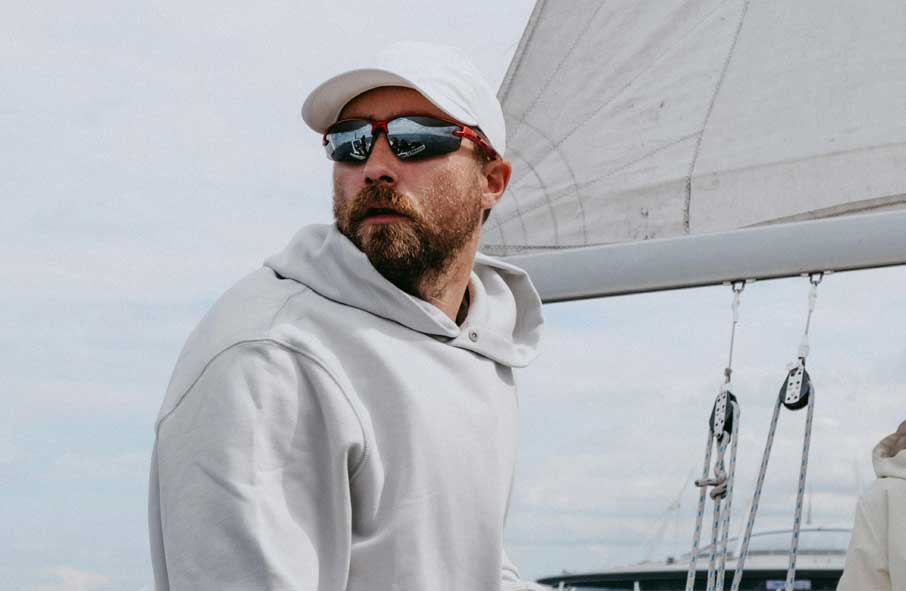
Sea time experience is one of the most important prerequisites.
You would need to have completed the following within the last ten years:
- At least 2500 miles logged.
- Spent 50 days at sea on yachts of up to 500GT.
- At least half the sea time must have been spent in tidal waters.
- Have completed five passages of over 60 miles, of which two passages were as a skipper, and two carried out at night.
- Have at least five days experience working as a skipper.
- Hold a valid First Aid Certificate. In the case of a STCW Elementary First Aid it needs to have been issued within the last five years, whereas in the case of an RYA First Aid it needs to be issued within the past three years.
- Be in possession of a GMDSS short-range VHF radio certificate.
The course duration is generally 5 days, including the exam.
The course content will comprise key areas that will allow one to be properly prepared for the exam.
The instructor will focus on areas where one needs to improve.
Notably, night sailing and blind navigation will be practiced.
There will be an overview of the lights, signals and collision regulations, among others.
Since different ports and harbours will be visited, you will be able to get tested in different waters, and your strengths and weaknesses will be better tackled in preparation for the exam.
The Yachtmaster Offshore Exam itself will take anywhere between 8 to 12 hours for a single candidate, or between 10 to 18 hours for two.
Candidates will be met onboard by examiners who will outline what will happen during the test.
Tasks will be set for the candidates to demonstrate their abilities as skippers of offshore cruising yachts.
Candidates should be well prepared as questions on any part of the syllabus can be asked at any stage.
Examiners will be independent assessors who evaluate candidates on behalf of the UK Maritime and Coastguard Agency .
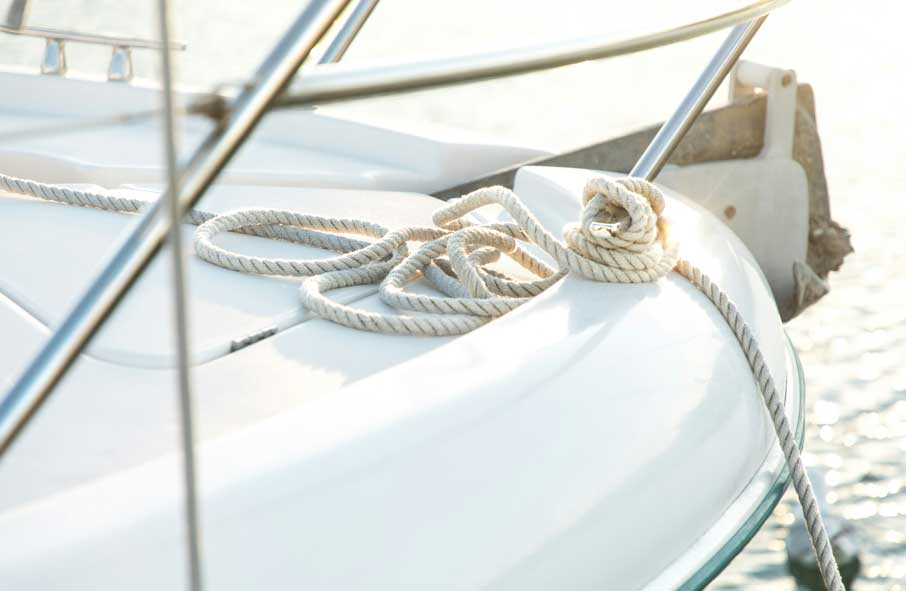
In order to convert from Yachtmaster offshore sail to Offshore Power the following will need to have been completed within the past 10 years:
- At least 1250 miles on a vessel that was between 7m and 24m in length.
- Have spent 25 days living onboard.
- Have spent 3 days as a skipper.
- Have carried out 3 passages exceeding 60 miles, of which one was as a skipper and one overnight.
There are a number of rules that need to be followed when it comes to passages that can be deemed as qualifying.
An applicant will need to have completed at least five passages which exceed 60 miles.
These five passages must have been completed on a vessel that is less than 24 metres in length.
Two of these passages need to have been overnight passages.
In addition, two of them will need to have been where one acted as a skipper.
It’s important to mention that a 60 mile qualifying passage is one where the voyage has been non-stop from the departure port A to departure port B, where A and B cannot be the same place.
The 60 mile distance has to be measured as a straight line from A to B.
The RYA will accept passages that were on board yachts over 24m in length.
However, only 50% of the qualifying sea time can be derived from such passages.
Thus, not more than 2500 miles in all, and one would need to provide a testimonial or a discharge book to confirm them.
The remaining 50% of the qualifying sea time must have been carried out on vessels which ranged between 7m and 24m.
Since so much importance is placed on passages, it’s crucial to record the miles.
Recording miles can be carried out in a RYA logbook G158, or using an Excel spreadsheet.
It’s also good to have a CV detailing one’s sea time.
When logging miles it’s important to take note of key details, including the dates of the passage or trip, the miles sailed on the various passages, the name and type of vessel, and any night hours.
Yes, you must have a valid first aid qualification in order to sit for the Yachtmaster Coastal or Offshore exam.
There are different types of first aid qualifications that are accepted, including:
- The RYA First Aid
- The STCW Elementary First Aid
- Seafish First Aid
It’s common to choose to commercially endorse the RYA Yachtmaster Coastal or Offshore exam qualification once the exam has been successfully completed.
In this case, besides holding a valid first aid and VHF certificate, one will also need an STCW or RYA Sea Survival certificate, as well as either an ENG1 medical certificate or an ML5 medical certificate .
One will also need to complete the RYA’s online PPR course.
Subsequently, one can apply for commercial endorsement through the RYA.
Following STCW Basic Safety Training , the RYA/MCA Yachtmaster Offshore certificate can be endorsed in order to allow the holder to be a skipper both on commercial as well as privately owned vessels.
This includes those exceeding 24m in length.
Yes, in order to become an RYA Yachtmaster Offshore it is highly recommended to know specific aspects of navigation and being able to handle a vessel at sea.
Thus, following a Yachtmaster Offshore Theory course is advisable to improve one’s abilities and competence.
This will inevitably improve one’s chances of successfully achieving the RYA Yachtmaster Certificate of Competence.
Becoming a yacht captain takes several years of training, experience and qualifications.
Like many careers, you’ll need to start life on a vessel working your way up.
From humble beginnings like being a deckhand to a junior crew member, the journey towards becoming a yacht captain takes years of dedication and hard work.
Our guide to becoming a yacht captain explains this process in greater detail.
Yes, the potential to make a very lucrative income is high.
A lesser experienced yacht captain can expect to make in the region of $48,000 to $98,000 per annum, whilst a more seasoned captain can make an impressive $150,000 gross per year.
So the time and effort it takes to become a skipper on a vessel has its rewards.
Furthermore, if your time at sea exceeds 183 days each calendar year, there’s the strong possibility that you could qualify for the seafarers earnings deduction which means you are not obliged to pay any income tax on your earnings.
So the above salary figures could be your final take home.
A good yacht captain will lead the crew, be a good communicator and instil confidence.
Acquiring the RYA Certificate is a demonstration that one has shown such skills along with the necessary experience.
Disclaimer: Any advice in this publication is not intended or written by Marine Accounts to be used by a client or entity for the purpose of (i) avoiding penalties that may be imposed on any taxpayer or (ii) promoting, marketing or recommending to another party matters herein.
Also on Marine Accounts
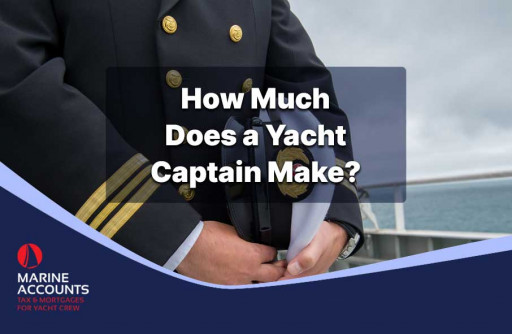
How Much Does a Yacht Captain Make?
Working as a yacht captain is a very privileged and unique employment position. In our article we explore what being a yacht captain involves and how much yacht captains make.
Patrick Maflin
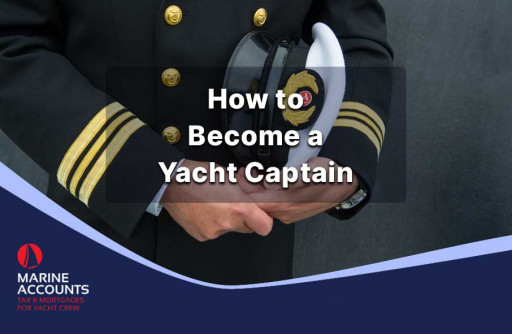
How to Become a Yacht Captain
Working as a captain on a superyacht can be a very rewarding career. But how do you become a yacht captain? Our article takes a deep dive into the process.
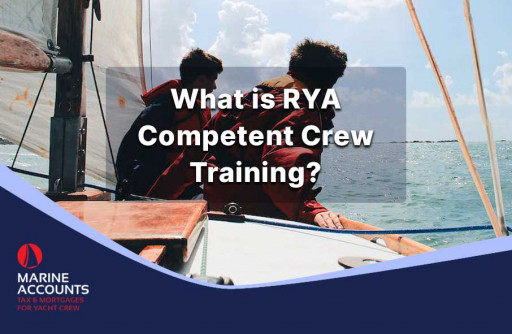
What is RYA Competent Crew Training?
RYA Competent Crew training is a beginners level sailing course, teaching basic knowledge and skills needed to become a competent crew member on a yacht. Read on to discover why even experienced yacht crew should consider taking this foundation course.
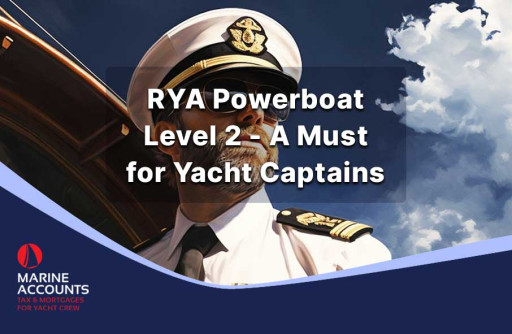
RYA Powerboat Level 2 Certificate - A Must for Yacht Captains
Gaining RYA powerboat level 2 certification is a must for any aspiring yacht captain. In our latest article, we explore what this crucial certificate is for, what you will learn, and how you go about getting one.
Before you go...
You're about to visit a page on our legacy site. We're currently in the process of updating all our tax tools and while this page is still active please return to the main Marine Accounts site after completition.
Refer a friend and receive £50!
Upon successful completion of the referral the cash will be transferred to you.
- Certificates of Competence
- RYA Yachtmaster Offshore exam
RYA Yachtmaster Offshore Exam
Full details of the exam syllabus and requirements are shown in the RYA Yachtmaster Scheme Syllabus and Logbook (G158) available from the webshop (see right).
RYA Yachtmaster Offshore practical exams can be taken under sail or power and your certificate will be endorsed accordingly. The candidate or a training centre provides the boat and the RYA provides an examiner. Note: All qualifying sea time and passages must be gained on vessels appropriate to the type of exam i.e. gained in sailing vessels for a sail exam and power vessels for a power exam.
There is no formal training course leading up to the exam, but those who have not previously taken RYA courses often find it useful to book themselves in for some informal training at an RYA centre prior to their exam. This training can be tailor-made to your specific needs and helps to fill any gaps in your knowledge that may become apparent.
The exam will include an assessment of your skippering skills, boat handling, general seamanship, navigation, safety awareness and knowledge of the IRPCS, meteorology and signals.
| Documented minimum sea time completed on a seagoing sailing or motor yacht (as appropriate) in the last 10 years: which may be reduced to 25 days if the candidate already holds an RYA Yachtmaster Offshore Certificate of Competence ; ; , which may be reduced to 1250 miles if the candidate already holds an RYA Yachtmaster Offshore Certificate of Competence if the candidate already holds an RYA Yachtmaster Offshore Certificate of Competence
At least half the qualifying sea time should be gained in tidal waters and on vessels less than 24m LOA, and all seatime must be on vessels of the same discipline as the exam to be taken, i.e. sail or power. Contact if your sea time is on a yacht greater than 24m and 500gt. For example, an RYA Yachtmaster Offshore Sail wishing to be examined for RYA Yachtmaster Offshore Power | |
| Practical | |
| . | |
| | 8-12 hours for 1 candidate, 10-18 hours for 2 candidates.No more than two candidates can be examined in 24 hours and no more than four candidates can be examined in one 2 day session. |
| 18 at the time of the exam |
Boats used for exams
You may use your own boat or a boat that you have chartered or borrowed. You will be responsible for ensuring the boat is seaworthy and suitable for the area in which the exam takes place and equipped as shown below.
The boat used must be between 7m and 18m (LOA) and be in sound, seaworthy condition, equipped to the standard set out in the RYA Boat Safety Handbook 2nd Edition (code G103). The boat must be equipped with a full up to date set of charts and navigational publications along with working instruments and either plotter or GPS. In addition to the candidate there should be two crew on board as the examiner will not take part in the management of the boat during the exam.
There may be vessels that will meet the guidelines outlined above but by virtue of their layout, construction, handling characteristics or other factors may be unsuitable for use for an RYA Yachtmaster Practical examination. The RYA reserves the right to refuse an exam on a vessel that, in the view of the RYA Chief Examiner, will not allow the examiner to conduct an examination to the standard required by the RYA/MCA Yachtmaster Qualification Panel.
Before you book your exam please check that you:
- can provide a boat
- have completed the required mileage and experience as skipper
- hold an SRC (Short Range Certificate) or higher level GMDSS radio operators qualification
- hold a valid first aid certificate
- have read the syllabus in RYA Logbook (G158)
- have read and comply with the pre-requisites above.
Additionally if not on the boat, you will need to bring to the exam:
- laminated or waterproof charts
- GPS set (may be hand held)
- tide tables
- pilotage information for the local area, eg pilot books, port information etc
- plotting instruments.
- Photographic ID card or document, such as a passport or driving licence
If you need your Certificate of Competence in order to work on board a commercial craft subject the MCA's codes of practice, you will need to get it commercially endorsed .
Useful links
Arranging your exam, commercial endorsements, exam payments service, mca manning requirements, professional qualifications.
- Yachtmaster Coastal (Power or Sail)
- Recreational

Yachtmaster Coastal Training
The IYT Worldwide Yachtmaster Coastal certificate is a recreational certificate of competency for command of sailing and/or power vessels up to 24 metres in length up to 60 nm offshore. It is a comprehensive live aboard course consisting of six days for sail or five days for power, which includes the practical on water examination. The minimum age to obtain this certification is 18. Candidates must either hold a recognised VHF Radio Operators Certificate or must take the full IYT VHF-SRC Marine Communications course and school must place order for this certificate while placing order for the Yachtmaster Coastal Certificate of Competency. If ordering VHF at the same time as Yachtmaster Coastal Certificate please upload a note to this effect. We have provided a sample note to upload when placing order. * Please note that we do not accept ISSA VHF qualifications. (I f you are unsure if your radio license will be accepted, please send a scanned copy of the front and back of your license to [email protected] . We will verify that your license is sufficient to receive the IYT Yachtmaster Coastal license).
It has come to our attention that it has not been made perfectly clear to all IYT Worldwide yachtmaster candidates that this certification is for recreational use only and may never be upgraded to a professional certificate. Therefore, we require all candidates taking a recreational IYT Worldwide Yachtmaster Coastal, Offshore or Ocean course to complete an acknowledgement prior to taking the course.
IYT’s Yachtmaster Coastal Sail Certificate covers command of a sailing vessel with a sail area of greater than 80 square metres/861 square feet. Please see the official statement here .
Course Outline
- International collision regulations
- Navigational charts and publications
- Dead reckoning and estimated position
- Position fixing
- Tides and currents
- Safety at sea
- Meteorology
- Boat handling
- Passage planning
Certificate Limitations
- Command of a vessel up to a maximum length of 78 ft /24 metres
- In coastal waters up to 60 miles offshore
- In moderate wind and sea conditions
- Not for commercial use
Note: Yachtmaster Coastal is a recreational course that can be taught in any language BUT cannot be upgraded to the professional Master of Yachts certificate.
What are the minimum entry requirements to apply for the IYT Yachtmaster Coastal course?
- 25 days and 800 miles at sea including 2 days as watch leader/skipper
- 12 hours underway on watch at night
- Minimum sea time must have been met prior to the final examination
What Does The Exam Consist Of?
The examination is an oral and practical test onboard a yacht plus a written theory exam. Candidates must demonstrate that they have sufficient ability to handle, dock, and anchor the boat with a required level of confidence. Candidates can expect to be examined on any subject contained within the syllabus and to be questioned on any of their yachting experience to date.
In the event that the examiner considers an examinee not to have achieved the required standards, a certificate will not be issued. In this case, a confidential report will be sent to the candidate outlining the reason or reasons for failure and suggesting remedial action that could lead to the successful completion of the course. Completion of the IYT Worldwide Yachtmaster Coastal course is not a guarantee of passing the examination and receiving your certificate.
How Do I Apply For Enrollment?
Candidates may apply to any of the participating IYT Worldwide Partner Schools worldwide who offer this course.
In order to apply for the IYT Worldwide Yachtmaster certification courses, a detailed yachting resume must be sent to your IYT training school for evaluation.
As you advance and become more proficient as crew or skipper you take on bigger challenges that require proper training to ensure the safety of your family and friends. The bigger the boat or length of adventure the more training you require.
Most of us prefer to spend our time on the water and not in a classroom. To facilitate this, IYT has a series of E-learning courses available for the theoretical part of sail and powerboat training.
- Take one of our online (Elearning) courses for your next level of training.
- Plan your practical training at one of our many schools worldwide to earn your final qualification.
- Book in advance with your school as class sizes and availability may be limited.
- Review the IYT course progression details to learn about professional level courses.
- Spend time on the water and properly log your seatime.
The Boating Lifestyle is one of the most rewarding pursuits available. There is something physically and emotionally invigorating when you are offshore. To enjoy the experience fully you need the proper training & skills to be safe, prepared and command a vessel.
Recreational Student Information
Benefits of an iyt certification.
IYT is the largest provider of crew and skipper certificates for the recreational yachting industry in the world. Learn more about the benefits of an IYT Certificate.
Certificate Renewal
For many IYT certificates, there is the need to re-qualify for your certificate every 3 to 5 years. This ensures that our certifications are meeting international standards.
IYT Yachting Passport
The IYT Passport is recognized in over 40 countries around the world and offers you an opportunity to study and train worldwide.
- Course Progression
A beginner at sailing or operating a powerboat should be familiar with the training path that is available from IYT. Many recreational boaters progress to become crew on superyachts.
- Privacy Policy & Terms Of Use
- Become a Partner School
- Register with IYT
- Find a School
- IYT E-Learning
- Certificate Renewal & Replacement
- Get Certified
- Recreational Training Course Progression
- IYT Passport
- Crossover Opportunities
- Course Progression Interior
- Dive Boat Training
- Forms And Docs
- Instructor Training
- Personal Watercraft Operator
- Dinghy Sailing Programme
- IYT Try Sailing
- IYT Introductory Sailing Skills
- IYT Day Skipper / Crew Sail
- International Crew
- International Flotilla Skipper
- International Bareboat Skipper
- International Flotilla Skipper Sail – Catamaran
- International Bareboat Skipper Sail – Catamaran
- International Certificate of Competency (ICC Certificate)
- Powerboat Skipper
- Yachtmaster Coastal Sail – Catamaran
- Yachtmaster Offshore (Power or Sail)
- Yachtmaster Offshore Sail – Catamaran
- Yachtmaster Ocean
- Patron de Yates (Yachtmaster Coastal Spanish edition)
- Marine Communications (VHF-SRC)
- Small Powerboat and Rib Master (MCA Recognised)
- IYT Commercial Tender License Course
- Weather Master
- Navigation Master
- Master of Yachts Coastal/Mate 200 Tons (Power or Sail)
- Master of Yachts Limited (Power or Sail)
- Master of Yachts Unlimited
- Superyacht Chef
- Superyacht Deck Crew Course
- Introduction to Yacht Marine Engineering
- Superyacht Hospitality Training
- Boat Engineer Course (SCV Code for Vessels Operating in the Caribbean)
- IYT-MSWI BoatMaster Course
- Become An IYT School
- Upgrade Your School
- Find A School
- Course Levels
- Instructor Qualifications
- Vessel Requirements
- Vessel and Facility Requirements
- Unauthorised Schools and Other Entities
- Shipping & Delivery
- Government Approvals
- Professional qualifications
Working as an RYA Yachtmaster
Your qualification must be appropriate to the vessel and area of operation. For commercial use, all certificates must be commercially endorsed .
Working with an RYA Yachtmaster® Coastal certificate
A commercially endorsed Yachtmaster Coastal Certificate of Competence will enable you to skipper vessels up to 24 metres in length, operating in category 3,4,5, and 6 waters - up to 20 miles from a safe haven.
Working with an RYA Yachtmaster® Offshore certificate
A commercially endorsed Yachtmaster Offshore Certificate of Competence will enable you to work as a Master of commercial vessels of up to 200gt in category 1 to 6 waters - that is up to 150 miles from a safe haven.
This Certificate of Competence can used commercially in its own right, or as a pre-requisite for the MCA's Officer of the Watch qualification, which enables you to work worldwide on vessels of up to 3000gt.
Working with an RYA Yachtmaster® Ocean certificate
A commercially endorsed Yachtmaster Ocean Certificate of Competence will enable you to work worldwide as a Master of commercial vessels of up to 200gt.
This Certificate of Competence can be used commercially in its own right. It is also a pre-requisite for the MCA's Chief Mate, Master 500 and Master 3000 qualifications.
For more information about working with RYA qualifications, the categorisation of waters and required certification click here .

IMAGES
COMMENTS
The gold standard. The RYA Yachtmaster® Certificate of Competence is often the ultimate aim of aspiring skippers. It is a well known, highly respected qualification worldwide, proving your experience and competence as a skipper. Unlike other qualifications in the cruising programme, there is no formal training course to become an RYA Yachtmaster.
RYA Yachtmaster Offshore exam pre-requisites. 5 passages over 60 miles long, which must include 2 overnight passages and 2 as skipper, which may be reduced to 3 passages including 1 overnight and 1 as skipper if the candidate already holds an RYA Yachtmaster Offshore Certificate of Competence 3. 1 At least half the qualifying sea time should be ...
A Yachtmaster qualification is a certificate of competence of the ability to handle either a sailing boat or motor boat (as endorsed) in certain prescribed conditions. Three different titles are specified; Yachtmaster Coastal (previously - and in some countries still - called Coastal Skipper), Yachtmaster Offshore, and Yachtmaster Ocean which ...
Recently, the old Coastal Skipper ticket has been superseded by the new 'Yachtmaster Coastal' certificate. The qualifying mileage for this MCA-recognised qualification is 800, with passage and night-hour requirements being relaxed in comparison with 'Yachtmaster Offshore', which keeps its 2,500-mile entry level.
The RYA Yachtmaster® Ocean is experienced and competent to skipper a yacht on passages of any length in all parts of the world. Qualifications. Full details of the exam syllabus and requirements are shown in the RYA Yachtmaster Scheme Syllabus and Logbook (G158), which is available from the RYA webshop. The exam consists of an oral and written ...
Like other British sailing schools, Sunsail's prep course (a highly recommended prerequisite to the RYA Yachtmaster exam) is a five-day on-the-boat affair. After that, the RYA examiner comes on board and tests two people at a time in succession. Since there were four of us, the exam would take two full days and nights.
A GMDSS short-range VHF radio certificate. A valid First Aid certificate. You must be 17 years old at the time of the exam. If you hold the RYA Coastal Skipper course completion certificate, then the miles required for Yachtmaster Coastal are reduced to 400.
The MPT Yachtmaster Coastal and Offshore Course (#300) is taught on a Motor Yacht and the practical training and examination are towards a Motor Certificate of Competence. (If you are applying for a Sail Endorsement, this course will not satisfy your practical training and exam requirements).
This internationally recognised certificate is required by commercial yacht skippers on sailing and motor vessels under 24 metres and as entry to Mega yacht qualifications. Also, many recreational sailors take RYA Yachtmaster exams as a measure of their competence. ... For those looking for super yacht accreditation, the requirements are RYA ...
The gold standard. The RYA Yachtmaster® Certificate of Competence is often the ultimate aim of aspiring skippers. It is a well known, highly respected qualification worldwide, proving your experience and competence as a skipper. Unlike other qualifications in the cruising programme, there is no formal training course to become an RYA Yachtmaster.
RYA Yachtmaster Offshore (Yachtmaster 200GT & 150NM Limited) An RYA Offshore certifies an individual as competent to captain a vessel up to 24m in length and no more than 200 Gross Tonnes. The offshore certification is applicable passages during which the yacht is no more than 150 miles from harbour. The Yacht master offshore consists of two ...
Prepare the boat for the manoeuvre (using the crew) Select the correct direction and angle of approach. Select the correct sail combination for this approach. Control the boat speed on the approach bringing the boat to a stop in a controlled manner. Picking up and secure to the mooring bouy safely.
This is to progress and upgrade your RYA Yachtmaster Offshore Motor certificate of competence to an RYA Yachtmaster Ocean Motor certificate of competence. To do this there is 3 main steps, first, ... Next, is to complete an ocean qualifying passage that meets the necessary requirements. Finally, you will then need to complete another exam, this ...
Note: Yachtmaster Offshore is a recreational course that can be taught in any language BUT cannot be upgraded to the professional Master of Yachts certificate. What are the minimum entry requirements to apply for the IYT Yachtmaster Offshore course? 1. 50 days on board a yacht at sea as an active crew member.
Furthermore the Yachtmaster Ocean CoC Exam is required for the Chief Officer 3000 Certificate of Competence (for yachts over 200 tonne). There are 5 stepping stones to becoming an Ocean Yachtmaster CoC holder. Steps 1-4 can be taken in any order although the order presented below is the most logical. Step 5 can only be completed once the first ...
The RYA Yachtmaster Certificate of Competence is a much sought after qualification for skippers. This qualification is respected worldwide. One will be able to acquire the RYA Yachtmaster Certificate if they are able to demonstrate that they have sufficient sea-time, experience and certification in order to sit for an exam.
Full details of the exam syllabus and requirements are shown in the RYA Yachtmaster Scheme and Logbook (G158) available from the RYA webshop. RYA Yachtmaster Coastal practical exams can be taken under sail or power and your certificate will be endorsed accordingly. You or a training centre provide the boat and the RYA provides an examiner.
The RYA Yachtmaster® Ocean is experienced and competent to skipper a yacht on passages of any length in all parts of the world. Qualifications. Full details of the exam syllabus and requirements are shown in the RYA Yachtmaster Scheme Syllabus and Logbook (G158), which is available from the RYA webshop. The exam consists of an oral and written ...
The RYA Yachtmaster Offshore Preparation Course teaches the skills and techniques required to skipper safely on offshore passages by day and by night, including passage planning, preparation for sea, pilotage, yacht handling under sail and power, as well as in adverse weather conditions and emergencies. The first five days of this seven-day ...
RYA Yachtmaster Offshore exam pre-requisites. 5 passages over 60 miles long, which must include 2 overnight passages and 2 as skipper, which may be reduced to 3 passages including 1 overnight and 1 as skipper if the candidate already holds an RYA Yachtmaster Offshore Certificate of Competence 3. 1 At least half the qualifying sea time should be ...
certification program and any exceptions must be pre-approved by WIN and the program; failure to get pre-approval will cause trainee's participation in the certification program to be terminated. • Understand that a failed test score or incompletion of any portion of the certification program means that trainee's participation in the
Program Requirements Calendar Year 2024 Program Requirements Pages in this section. Promoting Interoperability Programs; Program Requirements; Resource Library ... Certification criteria will be maintained and updated at 45 CFR 170.315. Future updates to the definition of Base EHR (45 CFR 170.102 and 170.315) will be incorporated into the CEHRT ...
This online certificate program teaches students relevant programming languages, statistics and the modeling and computational techniques needed for data science. With instruction from accomplished industry professionals and scholars, students will receive personalized attention and support that are tailored to ensure the success of each ...
Yachtmaster Coastal Training. The IYT Worldwide Yachtmaster Coastal certificate is a recreational certificate of competency for command of sailing and/or power vessels up to 24 metres in length up to 60 nm offshore. It is a comprehensive live aboard course consisting of six days for sail or five days for power, which includes the practical on ...
The Supreme Court on Thursday declined to revive parts of a Republican-backed Arizona law that could have barred thousands of voters from casting a ballot in the November presidential contest or ...
AHIMA is the worldwide professional association of recognized leaders in health information management, informatics, health data technology, and innovation. AHIMA values member diversity, continuing education, leadership development, and professional credentialing. AHIMA offers computer based certification exams for the RHIA, RHIT, CCA, CCS, CCS-P, CHDA, CHPS and CDIP credentials.
Prove your ability and experience as a skipper with an RYA Certificate of Competence. Available at Advanced Powerboat and RYA Yachtmaster® Coastal, Offshore and Ocean level, RYA Certificates of Competence are well known qualifications that are highly respected worldwide. Unlike other RYA qualifications, Certificates of Competence are not ...
A commercially endorsed Yachtmaster Ocean Certificate of Competence will enable you to work worldwide as a Master of commercial vessels of up to 200gt. This Certificate of Competence can be used commercially in its own right. It is also a pre-requisite for the MCA's Chief Mate, Master 500 and Master 3000 qualifications. For more information ...